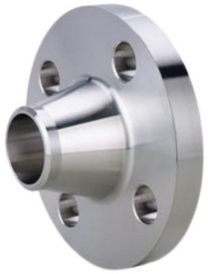
Weld Neck Flanges
M-Pipe & Fitting Solution Inc is a reputable company that manufactures and supplies high-quality weld neck flanges. Flanges are essential for piping systems to connect pipes, valves, and other equipment. They provide a secure and leak-free connection, allowing easy assembly, disassembly, and system maintenance. One type of flange commonly used in various industries is the weld neck flange. Weld neck flanges are designed to be butt-welded to the piping system. They are known for their high strength, durability, and reliability. These flanges have a long tapered hub, which transitions smoothly to the pipe or fitting, and a neck that extends from the hub. The neck has a beveled end prepared for welding to the pipe. They are available in different materials to suit various applications. Stainless steel, carbon steel, and duplex steel are three common types used in industrial settings. Let’s explore each of these materials in more detail: Stainless Steel Weld Neck Flanges: Stainless steel is widely used in industries requiring corrosion resistance, such as chemical processing, food and beverage, and pharmaceuticals. These flanges are resist corrosive environments and high temperatures. They are available in different grades, such as 304, 316, 321, and 347, to meet specific application requirements. Stainless steel weld neck flanges provide a robust connection and are suitable for critical applications where leakage is unacceptable. They are commonly used in pipelines handling corrosive fluids, such as acids, chemicals, and seawater. These flanges are also popular in hygienic applications thanks to their smooth surface finish, which is easy to clean and maintain. Carbon Steel Weld Neck Flanges: Carbon steel is known for its strength, affordability, and wide availability. Carbon steel weld neck flanges are commonly used in applications involving high pressure and elevated temperatures. They offer excellent mechanical properties and are suitable for various industries, including oil and gas, petrochemicals, and power generation. They are available in different grades, such as ASTM A105 and ASTM A350, to meet specific requirements. They are compatible with carbon steel pipes and provide a reliable, leak-free connection. These flanges are highly resistant to thermal and mechanical stress, making them suitable for demanding environments. Duplex Steel Weld Neck Flanges: Duplex steel combines austenitic and ferritic stainless steels, offering a unique combination of strength and corrosion resistance. Duplex steel weld neck flanges are highly resistant to pitting, crevice corrosion, and stress corrosion cracking. They are commonly used in offshore oil and gas, chemical processing, and desalination industries. They are available in various grades, such as ASTM A182 F51 (UNS S31803) and ASTM A182 F53 (UNS S32750). These flanges offer excellent mechanical properties and are suitable for high-pressure and high-temperature applications. They provide a secure connection and ensure the integrity of the piping system.In conclusion, weld neck flanges are vital in piping systems, providing a reliable and leak-free connection. Stainless steel weld neck flanges offer excellent corrosion resistance, carbon steel weld neck flanges provide strength and affordability, and duplex steel weld neck flanges offer a unique combination of strength and corrosion resistance. The choice of material depends on the application’s specific requirements and the environment in which it operates. Proper selection and installation of weld neck flanges are crucial for ensuring the safety and efficiency of the piping system. M-Pipe & Fitting Solution Inc provides certified flanges that meet international standards such as API, ASTM, and ISO 9001:2015.
...more
washer fasteners
M-Pipe & Fitting Solution Inc. is a well-known business that makes and sells high-quality washer fasteners. Washer fasteners are essential parts that are used in a wide variety of industries and settings to secure and steady systems. They come in various shapes, sizes, and materials to meet different needs. Washers with a Wedge Lock Wedge lock washers, also called “serrated washers,” are made to keep bolted connections from coming loose or moving due to shaking or dynamic loads. They have teeth on one or both sides that bite into the surfaces that fit together to create a strong link. Wedge lock washers are used a lot in building tools, heavy machinery, and cars. Round Washers Square washers are like circles and have a hole in the middle. They are used to spread the weight of a fastener over a larger area, making it less likely that the material it is connected to will get damaged or bent. Often, square washers are used in crafts, building, and electric work. Washers for sealing Sealing washers, also called rubber washers or gasket washers, are used to make a watertight seal between the fastener and the surface it is attached to. They are mostly made of rubber or another bendable material to make a tight seal and stop leaks. Sealing washers are commonly used in tanks, cars, and HVAC (heating, ventilation, and air conditioning). Flat Plain Washers The most popular type of washer fastener is the plain flat washer, also called a flat washer or a standard washer. It’s flat, round, and has a hole in the middle. It is used to spread the weight of a bolt and keep the surface from breaking. Plain flat washers are used in many places, like buildings, cars, and home items. Washers for factories Industrial washers are strong washers made to be used in complex settings. They are generally bigger and thicker than regular washers and are made of solid materials like hardened steel or stainless steel. Industrial washers are used in companies where strength and dependability are essential, like manufacturing, mining, and oil and gas. Hex Bolts Hex washers have six sides and teeth around the outside circle. They are also called hexagonal washers and hex washers with external teeth. These teeth grab the matching surface and lock it in place so it doesn’t move when shaken or turned. Hex washers are often used in cars, tools, and other industrial uses. The countersunk washers Countersunk washers are used with screws or nuts that are also countersunk. They’re also called finishing tools. They look like a cone with a flat top, and they are used to give the part that has been fixed a clean, finished look. Commonly, countersunk screws are used in woodworking, cabinets, and furniture. Lock Washers Fasteners Lock washer screws are designed to keep fixings from coming loose when they move or shake. There are many kinds, like split washers, washers with teeth, and star washers. Lock washer fasteners are often used in the car, aerospace, and machinery industries, where keeping the joint from coming apart is essential. Washers for the tabs Tab washers, also called lock tab washers or lock plate washers, have tabs or projections that bend against the fastener or the attached surface to make a safe lock. They are used in places like the car, electrical, and machinery industries where the pin needs to be kept from turning or coming loose. There are different kinds of tab washers, such as single, double, and multiple tab types. Washers for structures Structural washers are heavy-duty washers that are made for use in buildings. They are bigger and thicker than regular washers, so they can hold more weight and better maintain the structure. Most of the time, structural washers are used in construction, bridge building, and steel fabrication jobs where the link needs to be more solid and stable. Washer fasteners are essential in many industries because they keep systems stable, spread the load, and stop vibrations. Knowing the different kinds of washer fasteners, such as Wedge Lock Washers, Square Washers, Sealing Washers, Plain Flat Washers, Industrial Washers, Hex Washers, Countersunk Washers, Lock Washer Fasteners, Tab Washers, and Structural Washers, lets you choose the right one for your job. When choosing the suitable washer fastener, you must consider how well the materials go together, how much weight it can hold, where it will be used, and what kind of locking or binding you want. Talking to experts in the field or looking at engineering specs can help ensure a suitable washer fastener is picked for the best performance and dependability. Remember that picking and using suitable washer fasteners is essential for keeping structures or tools together and ensuring they last. Choosing the right washer clip and using the right way to put it on can make your projects safer, last longer, and work better. M-Pipe & Fitting Solution Inc sells certified fasteners that meet foreign standards such as API, ASTM, and ISO 9001:2015.
Size : M5-M50
Application : Fasteners Can Be Used In Racing Industries Such As Racing Motorcycles And Cars,Sailing Boats And Medical Equipment,Etc.
...more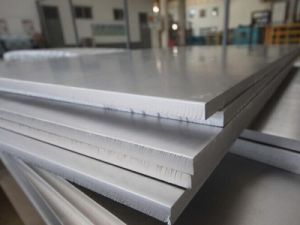
Titanium Sheets & Plates
M-Pipe & Fitting Solution Inc is a reputable company that manufactures and supplies high-quality titanium sheets & plates. Titanium is an excellent metal known for its exceptional strength-to-weight ratio, corrosion resistance, and biocompatibility. These properties make it highly desirable across various industries, including aerospace, automotive, medical, and chemical processing. Titanium Plate:Titanium plates are flat, rectangular sheets of titanium manufactured to precise dimensions and thicknesses. They are commonly used in applications that require high strength, excellent corrosion resistance, and lightweight characteristics. Titanium plates are available in various grades, including Grade 1, Grade 2, Grade 5 (Ti-6Al-4V), Grade 7, and Grade 12, each with specific composition and properties. Grade 1 titanium plates are the most ductile and softest among titanium grades. They offer excellent corrosion resistance in various environments but have the lowest strength compared to other grades. Grade 2 titanium plates exhibit slightly higher strength than Grade 1 while maintaining the same level of corrosion resistance. Grade 5 titanium plates, or Ti-6Al-4V, are the most widely used titanium alloy due to their excellent strength, toughness, and weldability. They perfectly balance strength and weight, making them ideal for aerospace and marine applications. Grade 7 titanium plates are corrosion-resistant and possess excellent weldability. They exhibit superior strength to Grades 1 and 2 but lower than Grade 5. Grade 12 titanium plates combine high strength with excellent corrosion resistance, making them suitable for applications in the chemical industry. Titanium Sheet:Titanium sheets are similar to titanium plates but are generally thinner, with thicknesses ranging from 0.5 mm to 4.0 mm. They share the same grades as titanium plates and offer comparable properties, including high strength, low density, and outstanding corrosion resistance. Titanium sheets find extensive use in industries where lightweight structures, excellent corrosion resistance, and formability are essential. Titanium Foil Sheet:Titanium foil sheets are even thinner than titanium sheets, typically ranging from 0.025 mm to 0.5 mm thick. Due to their ultra-thin nature, they possess excellent malleability and can be easily formed into complex shapes. Titanium foil sheets are utilized in applications such as electronics, medical devices, and aerospace components, where low weight, high strength, and superior corrosion resistance are critical. Cold Forming Titanium Sheet:Cold-forming titanium sheets involve the shaping and bending of titanium sheets at room temperature or slightly below, without additional heat. This process is often preferred when maintaining the material’s mechanical properties and avoiding the risk of grain growth or embrittlement associated with high-temperature forming methods. Cold-forming titanium sheets offer several advantages:It allows for intricate and precise forming of titanium components, enabling the production of complex shapes and designs.It minimizes the need for subsequent machining, reducing material waste and production costs.Cold forming preserves the inherent properties of titanium, such as its excellent corrosion resistance, high strength, and biocompatibility. Choosing the appropriate grade and thickness for the specific application is crucial to ensure the successful cold forming of titanium sheets. The design and tooling must be carefully engineered to accommodate the material’s characteristics, including its spring-back behaviour and low modulus of elasticity. Proper lubrication and tooling materials are also essential to prevent galling or surface damage during forming. In conclusion, titanium sheets, plates, and foils offer a wide range of benefits due to titanium’s unique properties. From high strength-to-weight ratio and corrosion resistance to biocompatibility, titanium is a versatile material with countless applicationsin various industries. Titanium plates are flat, rectangular sheets with strength and corrosion resistance, while titanium sheets are thinner versions with lightweight characteristics and formability. On the other hand, titanium foil sheets are fragile and malleable, making them suitable for specialized applications. Cold-forming titanium sheets are preferred when shaping and bending titanium at room temperature. It ensures the preservation of the material’s mechanical properties and avoids potential issues associated with high-temperature forming processes. Cold forming allows for intricate and precise shaping of titanium components, reducing the need for additional machining and minimizing production costs. When cold forming titanium sheets, it is crucial to consider the specific grade and thickness suitable for the desired application. The design and tooling should be carefully engineered to accommodate the material’s characteristics, such as its spring-back behaviour and low modulus of elasticity. Proper lubrication and selection of tooling materials are also essential to prevent surface damage and ensure a smooth forming process. The choice of titanium grade depends on the application requirements. Grade 1 and Grade 2 titanium offer excellent corrosion resistance and are commonly used in chemical processing, marine environments, and medical devices. Grade 5 (Ti-6Al-4V) titanium balances strength and weight, making it ideal for aerospace components and high-performance applications. Grade 7 and 12 titanium offer enhanced strength and corrosion resistance, suitable for specific industrial and chemical processing applications. In the aerospace industry, titanium sheets and plates are widely used for structural components, such as aircraft frames, wings, and engine parts. The lightweight nature of titanium allows for fuel efficiency and increased payload capacity. Additionally, titanium’s resistance to extreme temperatures and corrosive environments makes it suitable for aerospace applications. In medicine, titanium is highly valued for its biocompatibility, making it an ideal material for implants and surgical instruments. Titanium sheets and plates produce orthopaedic implants, dental implants, and prosthetics. The material’s corrosion resistance and ability to integrate with human tissue contribute to successful medical outcomes. The chemical processing industry relies on titanium sheets and plates for their exceptional resistance to corrosive environments. Titanium is used to construct reactors, heat exchangers, and piping systems, where it withstands harsh chemicals and extends equipment lifespan. In summary, due to their unique properties, titanium sheets, plates, and foils are vital components in various industries. They provide strength, lightweight characteristics, corrosion resistance, and biocompatibility, making them indispensable in aerospace, medical, chemical processing, and other high-performance applications. Cold-forming titanium sheets preserve these properties while enabling precise shaping and reducing production costs. The versatility of titanium continues to drive innovation and advancements in multiple fields. M-Pipe & Fitting Solution Inc provides certified sheet & plates that meet international standards such as API, ASTM, and ISO 9001:2015.
Grade : Titanium Gr2,Gr7,Gr5 / UNS R50400,R56400,R56400,ASTM B265 / ASME SB265
...more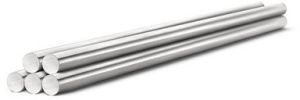
Titanium Round Bar
M-Pipe & Fitting Solution Inc is a reputable company that manufactures and supplies high-quality titanium round bar. Titanium is a lightweight, corrosion-resistant metal with an excellent strength-to-weight ratio, making it an ideal material for various industrial applications. A titanium round bar is a cylindrical-shaped bar made from titanium alloy, a mixture of Titanium and other elements such as aluminum, vanadium, and molybdenum. The alloying elements improve Titanium’s mechanical and chemical properties, making it more robust, malleable, and corrosion-resistant.Titanium round bar come in various sizes, from small diameters used in medical implants to large diameters used in aerospace and marine applications. The bars can be produced using various manufacturing techniques, such as hot rolling, cold rolling, and extrusion, depending on the desired size, shape, and properties.Titanium round bar are used in a wide range of applications, including: Aerospace: Titanium round bars are used in aircraft components such as landing gear, wing spars, and engine components due to their high strength-to-weight ratio, corrosion resistance, and ability to withstand high temperatures.Medical: Titanium round bars are used in medical implants such as joint replacements, dental implants, and pacemaker components due to their biocompatibility, corrosion resistance, and strength.Marine: Titanium round bars are used in marine applications such as propeller shafts, hulls, and offshore structures due to their resistance to corrosion in saltwater environments.Chemical processing: Titanium round bars are used in chemical processing equipment such as heat exchangers, reactors, and pumps due to their resistance to corrosive chemicals and high temperatures.Sports equipment: Titanium round bars are used in sports equipment such as golf clubs, tennis rackets, and bicycles due to their strength, durability, and lightweight. A titanium rod is similar to a titanium round bar but is typically smaller in diameter and used in more specialized applications. Due to their high strength, durability, and biocompatibility, titanium rods are commonly used to manufacture medical implants, jewelry, and precision machinery.Titanium welding rods are used in welding applications to join two pieces of Titanium or titanium alloy. Titanium welding rods are available in various sizes and alloys, depending on the welding technique, joint configuration, and application requirements. The most common types of titanium welding rods are titanium Grade 2 and titanium Grade 5, which are widely used in aerospace, marine, and chemical processing industries.When working with Titanium round bars, rods, or welding rods, it is essential to follow proper handling, machining, and welding techniques to ensure the material’s integrity and safety. Titanium is known to be challenging to machine due to its strength and flexibility, so specialized equipment and cutting tools are required to achieve the desired results.Welding titanium requires special techniques and precautions due to the material’s high reactivity and sensitivity to contamination. Welding titanium typically involves using a high-purity shielding gas, such as argon or helium, to prevent oxidation and contamination. Proper pre-weld cleaning and post-weld heat treatment are also crucial to ensuring the quality and strength of the welded joint. Titanium round bars and welding rods are essential for various industrial applications. Their high strength, durability, and resistance to corrosion make them ideal for use in aerospace, medical, marine, chemical processing, and sports equipment industries. However, working with Titanium requires specialized equipment, machining techniques, and welding procedures to ensure the material’s integrity and safety. Furthermore, titanium round bars offer several advantages over other materials in various applications. One of the key advantages is their exceptional corrosion resistance. Titanium’s natural oxide layer on its surface provides a protective barrier against corrosive environments, including saltwater, chemicals, and acids. This inherent corrosion resistance significantly extends the lifespan of Titanium round bars, making them suitable for long-term use in harsh conditions.Another notable advantage of Titanium round bars is their high strength-to-weight ratio. Titanium is renowned for its excellent strength, comparable to steel, but with approximately half the weight. It makes titanium round bars an ideal choice in applications where weight reduction is crucial, such as aerospace and sports equipment manufacturing. The lightweight nature of Titanium also contributes to improved fuel efficiency in the aerospace and automotive industries. Additionally, Titanium possesses superb biocompatibility, which is compatible with the human body and exhibits minimal reactivity or rejection when used in medical implants. Titanium round bars are widely used in orthopedic implants, such as hip and knee replacements and dental implants. The biocompatibility of Titanium ensures a reduced risk of adverse reactions and promotes better patient outcomes.Titanium round bars also exhibit excellent heat resistance. They can withstand high temperatures without deformation or loss of mechanical properties. This property is particularly advantageous in applications that involve elevated temperatures, such as chemical processing equipment and high-performance engines. Moreover, titanium round bars are highly versatile and can be machined into various shapes and sizes to meet specific requirements. They are known for their excellent formability, allowing easy fabrication into intricate components. Titanium’s flexibility enables the production of complex designs and precise machining, making it a preferred choice in industries that demand intricate parts and components.Round titanium bars can be welded using different techniques, including gas tungsten arc welding (GTAW) and electron beam welding (EBW). However, welding titanium requires specialized expertise and precautions due to its unique characteristics. Titanium’s high reactivity necessitates using inert gas shielding during welding to prevent contamination and oxidation. Additionally, stringent cleanliness standards must be maintained to ensure high-quality welds. In conclusion, titanium round bars are highly sought-after materials for their exceptional strength, corrosion resistance, and biocompatibility. They find extensive use in aerospace, medical, marine, chemical processing, and sports equipment industries. The unique properties of Titanium make it a preferred choice for applications that require lightweight, durable, and corrosion-resistant materials. Despite some challenges associated with machining and cost, round titanium bars offer unparalleled benefits in various industrial sectors. M-Pipe & Fitting Solution Inc provides certified round bar that meet international standards such as API, ASTM, and ISO 9001:2015.
Length : :
...more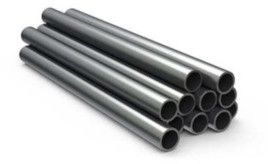
Titanium Grade 5 Pipes
M-Pipe & Fitting Solution Inc is a reputable company that manufactures and supplies high-quality titanium grade 5 pipes. Titanium Grade 5 Pipes are a great example of the fantastic things that can be done with titanium metals in the modern industrial world. These pipes have gotten a lot of attention from many different businesses because of how strong they are, how well they resist corrosion, and how light they are. Titanium Grade 5 Pipes have been used in everything from aircraft engineering to medical devices, and they have shown that they are the best at what they do. Titanium Grade 5 ERW Pipes are welded to make them last longer.The ERW (Electrical Resistance Welded) type of Titanium Grade 5 Pipes stands out as a great example of how durable and well-made something can be. During the process of making these pipes, electric currents join the edges of the titanium sheets, creating a strong and smooth joint. This welding method ensures that the material keeps its natural resistance to corrosion. It makes Titanium Grade 5 ERW Pipes an excellent choice for industries like chemical processing and naval engineering, where opposition to harsh environments is significant. Titanium Grade 5 Seamless Pipes: The Definition of SeamlessnessTitanium Grade 5 Seamless Pipes take center stage when a steady, unbroken flow is essential. Since these lines don’t have any welded joints, they have excellent fluid dynamics and a low risk of leaks and contamination. For the seamless method, a solid billet of titanium is heated and pushed through a die to make a pipe. It gives the pipe a uniform structure with no weak spots. Titanium Grade 5 Seamless Pipes are a good choice for industries like oil and gas, where the smooth flow of fluids is significant. ASTM B861 titanium pipes meet the highest standardsThe requirements for seamless and welded titanium pipes, like Titanium Grade 5 Pipes, are set by the ASTM B861 specification. By following these rules, the pipes are sure to meet high standards for quality and efficiency. It is essential because these lines are used for many different and complex tasks. ASTM B861 Titanium Pipes ensure that everything works reliably and consistently, from airplane parts that have to withstand high temperatures and pressures to medical treatments that must be biocompatible and last a long time. Where Strength and Flexibility Meet: Titanium Grade 5 Welded PipesTitanium Grade 5 Welded Pipes are the best choice when strength and flexibility are essential. The sheets or plates of titanium are welded together to make these pipes. It combines the power of the material with the ability to create intricate patterns. Because of this, they are instrumental in fields like building and car engineering, where solid structures and flexible designs go hand in hand. The welds are done carefully to keep the Grade 5 titanium alloy’s overall properties. It ensures that the end product keeps its high mechanical strength and resistance to corrosion. Uses in different industries: a sign of versatilityTitanium Grade 5 Pipes are helpful in many fields, showing their versatility and reliability. In in-flight engineering, where parts have to work in harsh conditions, and weight is a big deal, these pipes are used in airplanes’ frames, landing gear, and engine parts. Because they are biocompatible and don’t react with body fluids, they are used in surgery implants, pacemakers, and other medical tools. Chemical processing companies use them to move dangerous chemicals because they don’t rust, and the oil and gas industry uses them to move fluids over long distances because they are reliable. Changes and Innovations: Creating the FutureAs technology and materials science improve, Titanium Grade 5 Pipes could be used for anything. Additive manufacturing methods, like 3D printing with titanium powders, are making it possible to make pipes with shapes that were not possible before. These methods make it possible to create complicated internal forms that improve how fluids flow or how strong a structure is. Also, researchers are constantly working to make titanium metals easier to weld. It means that Titanium Grade 5 Welded Pipes will continue to be important in industries that need strength and design flexibility. Titanium Grade 5 Pipes are the best industry materials regarding how well and reliably they work. Their high strength, corrosion resistance, and ability to be used in many different ways have made them essential in aerospace, medicine, chemistry, and more. Whether they are ERW, seamless, or welded pipes, each has features that meet each application’s needs. M-Pipe & Fitting Solution Inc provides certified pipes & tubes that meet international standards such as API, ASTM, and ISO 9001:2015.
Type : Seamless / ERW / Welded / Fabricated Pipes
Length : Single Random,Double Random & Required Length
...more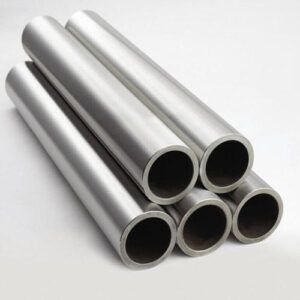
Titanium Grade 2 Pipes
M-Pipe & Fitting Solution Inc is a reputable company that manufactures and supplies high-quality titanium grade 2 pipes. Titanium Grade 2 pipes are a great example of the great things modern metals and materials science can do for industry and high-tech engineering. These pipes, which are made from ASTM B861 Titanium, are the best of the best when it comes to strength, durability, and versatility. They can be used in many businesses and offer many benefits. ASTM B861 Titanium Pipes: Excellence in Pipe Standards RevealedThe ASTM B861 specification is the best way to ensure that titanium pipes are of the highest quality and work the best. The ASTM B861 standard is known for its detailed rules and strict requirements. It ensures that the Titanium Grade 2 pipes meet the tightest tolerances and quality checks. These pipes are made to meet the changing needs of industries like aircraft, marine, chemical processing, and medicine, where resistance to corrosion, strength, and lightweight are significant. Titanium Grade 2 Seamless Pipes: Putting Excellence Together SeamlesslySeamless lines have changed how fluids are transported because they are efficient and reliable. Titanium Grade 2 seamless pipes are perfect for places where rust is a big problem. Because they are made without any seams, they don’t have any weak spots like welded parts can. This quality ensures better fluid flow and makes the pipe system last a lot longer. Titanium Grade 2 seamless pipes have a lot of great rates that have helped industries such as chemical processing, oil and gas, and even desalination plants. Where Strength and Precision Meet: Titanium Gr2 Welded Pipes Welded pipes have a different set of benefits than seamless pipes. Seamless pipes are very resistant to rust. Titanium Gr2 welding pipes are well-known for their high-strength welds, which keep the lines structurally sound even in challenging situations. The titanium is carefully melted together to make these pipes. It possesses the material’s natural qualities while reducing the risks of stress concentrations. It makes Titanium Gr2 welded pipes an excellent choice for businesses that need strong lines that can also be made to fit the needs of a particular project. Titanium Gr2 ERW Pipes: Bridging the Gap Between Efficiency and CostFinding a good balance between efficiency and cost is challenging in piping solutions. It is where Electric Resistance Welded (ERW) Titanium Gr2 pipes come in. ERW pipes are a cheaper option than seamless and fully welded pipes. Even though they are more affordable, they still have high corrosion resistance and durability. These lines are used in many fields, such as building structures, cars, and industrial equipment, where minimizing costs is a top priority. Titanium Grade 2 Pipes Have Benefits That Can’t Be Beat: Corrosion resistance: One of the best things about Titanium Grade 2 pipes is that they are very corrosion-resistant. It is because a thin, stable layer of oxide forms on the surface of the titanium. This layer keeps harsh chemicals and corrosive conditions from breaking down the pipe. The ratio of Strength to Weight: The strength-to-weight ratio of Titanium Grade 2 pipes is excellent. Because of this, they are a great choice for situations where the weight of the piping system needs to be kept as low as possible without sacrificing strength and sturdiness. Biocompatibility: Biocompatibility is the most essential thing in medical and pharmaceutical uses. Titanium Grade 2 pipes are very biocompatible, which means they can be used in implants, surgery, and other medical tools. High-Temperature Performance: Titanium Grade 2 pipes keep their mechanical qualities even when the temperature is high. It is essential for aerospace and power generation industries, where high temperatures are expected. Low Thermal Expansion: Because titanium has a low coefficient of thermal expansion, these pipes keep their shape and structural stability even when the temperature changes a lot. Aesthetic Appeal: Titanium pipes are not only suitable for smoking, but they also look good. Their sleek, modern look makes them great for apps that focus on architecture and design. In conclusion, Titanium Grade 2 pipes made from ASTM B861 titanium, which can be seamless, welded, or ERW, have changed piping systems’ strength, longevity, and versatility standards. These pipes are used in many businesses because they solve problems like corrosion, have good strength-to-weight ratios, are biocompatible, and work well at high temperatures. As technology improves, Titanium Grade 2 pipes are a great example of how far engineering and metallurgy have come. They are pushing businesses toward a future of efficiency, durability, and new ideas. M-Pipe & Fitting Solution Inc provides certified pipes & tubes that meet international standards such as API, ASTM, and ISO 9001:2015.
Length : Single Random,Double Random & Cut Length.
Dimension : ASTM,ASME And API
...more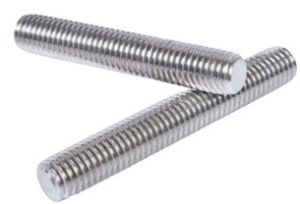
Threaded Studs Fasteners
M-Pipe & Fitting Solution Inc is a reputable company that manufactures and supplies high-quality threaded stubs fasteners. Fasteners are pieces of metal that hold two or more things together. Threaded studs are a type of fastener made up of a cylindrical rod with a helical thread design that allows it to be screwed into a tapped hole. There are different kinds of threaded screws, and each one is made for a different job. In this piece, we’ll talk about the different kinds of threaded studs and what they’re used for, focusing on tap-end stud bolts, double-end threaded studs, flange bolting studs, reduced shank studs, full threaded studs, weld stud bolts. Tap End Stud BoltsTap-end stud bolts, also called tap-end studs, have a threaded end and a hexagon-shaped head on the other end. They are often used in places with high temperatures, like petrochemical plants, power plants, and factories, where they must often be maintained and fixed. The threaded end of a tap-end stud is put into a tapped hole, and the hex head is used to tighten or loosen the stud. Tap end stud nuts come in different sizes and types of metal, such as carbon steel, alloy steel, and stainless steel. Studs with Threads on Both EndsDouble-end threaded studs, also called double-end studs or threaded rods, have threads on both ends and are used to join two parts. They are often used in electrical, construction, and auto uses. Double-ended threaded studs come in different lengths and sizes and are made from steel, stainless steel, and brass, among other things. They can also be covered with zinc or black oxide to prevent rust. Flange Bolting StudsThreaded flange fixing studs are used to connect two flanges. They have a threaded end that screws into a tapped hole on one side and a machined hex head used to tighten or loosen the stud. Flange bolting studs are used in pipelines, petrochemical plants, and oil facilities, among other places. They come in different sizes and types of steel, such as carbon steel, alloy steel, and stainless steel. Studs with a short shankReduced shank studs, which are also called partly threaded studs or step studs, have a shank with a smaller diameter and one threaded end and one unthreaded end. They are used when the hole size in one part is more significant than the size in the other. Reduced shank studs are often used in building, automotive, and aerospace industries. They come in different lengths and sizes and can be made of steel, stainless steel, and brass, among other things. Studs with a Full ThreadFull-threaded studs, also called fully-threaded studs or continuously-threaded studs, have threads along the whole length of the stud. They are used in construction, machinery, and manufacturing where a robust and reliable link is needed. Studs with total threads come in different sizes and materials, such as carbon steel, alloy steel, and stainless steel. They can also be covered with zinc or black oxide to prevent rust. Weld Stud BoltsWeld stud bolts are made of threaded studs bonded to a metal surface using “stud welding.” They have a threaded end that screws into a tapped hole on one part and a welding end bonded to the other. Weld stud bolts are often used in shipbuilding, construction, and industry, where a robust and permanent connection is needed. They come in different sizes and types of steel, such as carbon steel, alloy steel, and stainless steel. In the end, threaded studs are an essential type of fastener that can be used in many different ways. They come in different shapes and sizes, each for different uses. The most popular types of threaded studs used in different industries are tap-end stud bolts, double-end threaded studs, flange bolting studs, reduced shank studs, full-threaded studs, and weld stud bolts. These fasteners are a safe, reliable, inexpensive way to join or bind two or more parts. When choosing a threaded stud for a particular application, it’s essential to consider the stud’s material, size, thread pattern, and unique needs, such as temperature, pressure, and environment. If you choose the wrong type of threaded stud, it could fail, which could cause severe problems like machine damage, downtime, or even injuries. Other threaded studs, like hanger bolts, anchor bolts, and tie rods, are made for specific uses. When choosing a threaded stud for a particular purpose, it is essential to talk to a knowledgeable supplier or engineer to ensure that the chosen fastener meets all of the necessary specifications and requirements. In the end, threaded studs are essential in many industries because they are a reliable and cost-effective way to join or secure two or more parts. Tap-end stud bolts, double-end threaded studs, flange bolting studs, reduced shank studs, full threaded studs, and weld stud bolts are some of the most popular types of threaded studs. Each has its features and uses. To choose the right threaded stud for a given purpose, you must carefully consider several factors, such as the material, the size, and special needs. It will ensure that the connection is secure and reliable. M-Pipe & Fitting Solution Inc provides certified fasteners that meet international standards such as API, ASTM, and ISO 9001:2015.
Usage : Fasteners Can Be Used In Racing Industries Such As Racing Motorcycles And Cars,Sailing Boats And Medical Equipment,Etc.
Size : M5-M50
...more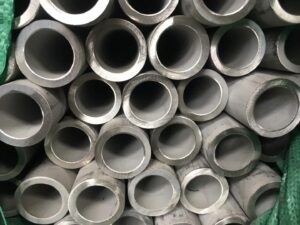
Super Duplex 2507 Pipes
M-Pipe & Fitting Solution Inc is a reputable company that manufactures and supplies high-quality super duplex 2507 pipes. Super Duplex 2507 pipes are highly durable, corrosion-resistant, and widely used in various industries. Known for their exceptional strength, these pipes are made from a super duplex stainless steel alloy, which offers a unique combination of properties that make them suitable for demanding applications. Features and Composition:Super Duplex 2507 pipes are made from a stainless steel alloy with more chromium, molybdenum, and nitrogen than standard duplex stainless steel. The composition of Super Duplex 2507 typically consists of approximately 25% chromium, 7% nickel, 4% molybdenum, and 0.25% nitrogen. This unique composition offers excellent resistance to corrosion, high mechanical strength, and good weldability. Corrosion Resistance:One of the critical advantages of Super Duplex 2507 pipes is their exceptional corrosion resistance. These pipes exhibit high resistance to various corrosive environments, including seawater, chloride-containing solutions, acidic and alkaline solutions, and organic acids. The alloy’s presence of chromium, molybdenum, and nitrogen enhances its pitting and crevice corrosion resistance, making it suitable for offshore and marine applications. Mechanical Properties:Super Duplex 2507 pipes possess excellent mechanical properties, combining high tensile and yield strength with good elasticity. These pipes offer higher strength than conventional austenitic or duplex stainless steels, enabling them to withstand high-pressure and high-temperature environments. The mechanical properties of Super Duplex 2507 pipes make them ideal for applications in the oil and gas, chemical processing, and petrochemical industries. Weldability:Super Duplex 2507 pipes have good weldability, allowing easy fabrication and installation. However, it is essential to follow proper welding procedures to ensure optimal results. M-Pipe & Fitting Solution Inc, a leading company in the field, provides expertise in welding and offers customized solutions to meet specific customer requirements. Applications:Super Duplex 2507 pipes find extensive applications in various industries due to their unique properties. Some typical applications include: Oil and Gas Industry: These pipes are used in offshore and onshore oil and gas exploration, production, and transportation, where resistance to corrosive environments, high-pressure conditions, and stress corrosion cracking is crucial. Chemical Processing Industry: Super Duplex 2507 pipes are employed in chemical plants, where they handle corrosive chemicals and acids effectively. They are also used in desalination plants and heat exchangers. Petrochemical Industry: These pipes are utilized in refineries, gas processing plants, and petrochemical facilities, where they transport corrosive fluids and withstand high temperatures and pressures. Marine Industry: Super Duplex 2507 pipes are extensively used in marine applications such as offshore platforms, seawater systems, and shipbuilding due to their superior resistance to saltwater corrosion. M-Pipe & Fitting Solution Inc:M-Pipe & Fitting Solution Inc is a renowned company that provides high-quality Super Duplex 2507 pipes and related solutions. With their expertise in the field, they offer a wide range of products to cater to the diverse needs of industries. The company is committed to delivering excellence and ensuring customer satisfaction by providing customized solutions, prompt delivery, and technical support. Super Duplex 2507 pipes are reliable for industries requiring exceptional strength and corrosion resistance. Their unique composition and properties make them suitable for challenging environments, such as offshore oil and gas installations, chemical processing plants, petrochemical facilities, and marine applicationssuch as seawater systems and shipbuilding. M-Pipe & Fitting Solution Inc, a trusted company in the industry, offers high-quality Super Duplex 2507 pipes and specializes in providing customized solutions to meet specific project requirements. In addition to their corrosion resistance and mechanical properties, Super Duplex 2507 pipes offer several other benefits: High Strength: Super Duplex 2507 pipes are more robust than standard stainless steel. It allows them to withstand high pressures and heavy loads, making them suitable for critical applications in demanding industries. Excellent Fatigue Resistance: These pipes resist fatigue and stress corrosion cracking, ensuring their durability and longevity even in challenging operating conditions. It is imperative in applications where cyclic loading and vibrations are present. Cost-Effective: Although Super Duplex 2507 pipes may have a higher initial cost than other materials, their long-term cost-effectiveness comes from their durability, low maintenance requirements, and extended service life. The reduced need for replacements and repairs can result in significant cost savings over time. Versatility: Super Duplex 2507 pipes are available in various sizes, thicknesses, and forms, including seamless and welded pipes, allowing for flexibility in design and installation. M-Pipe & Fitting Solution Inc offers many options to accommodate different project specifications. Resistance to Chloride-Induced Stress Corrosion Cracking: Chloride-induced stress corrosion cracking is joint in environments containing chloride ions, such as seawater. Super Duplex 2507 pipes have enhanced resistance to this type of corrosion, providing added protection and reliability. Ease of Maintenance: Super Duplex 2507 pipes require minimal maintenance, reducing downtime and associated costs. Regular inspections and preventive measures can help prolong their service life and ensure optimal performance. M-Pipe & Fitting Solution Inc is known for its commitment to quality and customer satisfaction. They adhere to strict quality control measures, ensuring their Super Duplex 2507 pipes meet industry standards and specifications. The company also offers technical support and assistance, helping customers select the right products and providing guidance on installation and maintenance. In conclusion, Super Duplex 2507 pipes offered by M-Pipe & Fitting Solution Inc are a reliable choice for industries requiring high-strength and corrosion-resistant piping solutions. These pipes’ exceptional properties find extensive applications in various sectors, including oil and gas, chemical processing, petrochemical, and marine industries. M-Pipe & Fitting Solution Inc expertise and commitment to delivering superior products make them a trusted partner for customers seeking reliable and customized Super Duplex 2507 pipe solutions. M-Pipe & Fitting Solution Inc provides certified pipes & tubes that meet international standards such as API, ASTM, and ISO 9001:2015.
...more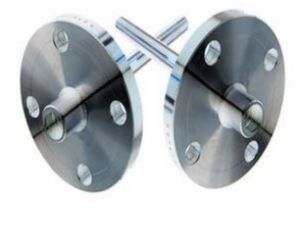
Stainless Steel Thermowell Flanges
M-Pipe & Fitting Solution Inc is a reputable company that manufactures and supplies high-quality stainless steel thermowell flanges. Stainless steel thermowell flanges are essential in various industries to protect temperature sensors in harsh environments. They offer reliable and accurate temperature measurements while ensuring the safety and longevity of the sensors. Stainless Steel Thermowell Flanges: Stainless steel thermowell flanges are designed to protect temperature sensors such as thermocouples or resistance temperature detectors (RTDs) from corrosive or high-pressure environments. These flanges act as a barrier, allowing the sensor to measure temperature accurately while shielding it from process conditions that may damage or affect its performance. Duplex Steel Thermowell Flanges: Duplex stainless steel thermowell flanges are highly sought for their exceptional corrosion resistance and mechanical properties. They are composed of a mixed microstructure of austenite and ferrite, offering superior strength and resistance to pitting, crevice corrosion, and stress corrosion cracking. These properties make duplex steel thermowell flanges ideal for applications in offshore oil and gas, chemical processing, and marine industries. Super Duplex Thermowell Flanges: Super duplex stainless steel thermowell flanges take corrosion resistance to the next level. They have an even higher chromium and molybdenum content, resulting in enhanced resistance to highly corrosive environments, such as those containing chlorides, acids, or seawater. Super duplex thermowell flanges provide excellent mechanical strength, making them suitable for extreme conditions in chemical plants, desalination facilities, and petrochemical industries. Advantages of Stainless Steel Thermowell Flanges: Stainless steel thermowell flanges offer numerous advantages in industrial applications. Some key benefits include: Corrosion resistance: Stainless steel thermowell flanges exhibit exceptional corrosion resistance, ensuring long-term reliability and durability in harsh environments. Temperature accuracy: These flanges provide an accurate and consistent temperature measurement by shielding the sensor from the process medium. Versatility: Stainless steel thermowell flanges are available in various sizes, shapes, and configurations to accommodate different sensor types and process conditions. Easy installation and maintenance: They are designed for straightforward installation and require minimal maintenance, reducing downtime and operating costs. Applications of Stainless Steel Thermowell Flanges: Oil and gas: Offshore platforms, refineries, and pipelines rely on these flanges to monitor temperatures in corrosive and high-pressure environments. Chemical processing: Thermowell flanges protect sensors from aggressive chemicals, acids, and caustic solutions in chemical plants. Power generation: They are used in power plants to measure temperatures in steam lines, boilers, and turbines. Food and beverage: Stainless steel thermowell flanges are suitable for hygienic applications, ensuring accurate temperature monitoring in food processing and brewing industries. Stainless steel thermowell flanges, including duplex steel and super duplex steel variants, play a critical role in temperature measurement and protection of sensors in demanding industrial environments. Their corrosion resistance, temperature accuracy, and versatility make them indispensable components in various industries. By choosing the right type of stainless steel thermowell flanges, businesses can ensure reliable temperature monitoring and prolong the lifespan of their sensors. To summarize, stainless steel thermowell flanges provide a reliable solution for protecting temperature sensors in harsh environments. Duplex steel thermowell flanges offer excellent corrosion resistance and mechanical properties, making them suitable for offshore, chemical, and marine applications. Super duplex thermowell flanges take corrosion resistance to the next level and are ideal for industries dealing with highly corrosive environments. The advantages of stainless steel thermowell flanges include their corrosion resistance, temperature accuracy, versatility, and ease of installation and maintenance. They find applications in oil and gas, chemical processing, power generation, and food and beverage industries. When selecting stainless steel thermowell flanges, it is essential to consider the specific application requirements, temperature and pressure ratings, and compatibility with the sensor type. In conclusion, stainless steel thermowell flanges are crucial for accurate temperature measurement and sensor protection. By utilizing duplex steel and super duplex steel options, businesses can enhance the performance and durability of their temperature monitoring systems. Whether in offshore drilling rigs, chemical processing plants, or power generation facilities, stainless steel thermowell flanges provide the reliability and longevity needed for successful industrial operations. M-Pipe & Fitting Solution Inc provides certified flanges that meet international standards such as API, ASTM, and ISO 9001:2015.
...more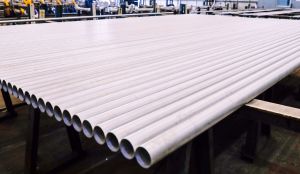
Stainless Steel Seamless 904L Pipes
M-Pipe & Fitting Solution Inc is a reputable company that manufactures and supplies high-quality stainless steel seamless 904L pipes. A non-stabilized low carbon high alloy austenitic stainless steel is a 904L stainless steel pipe. It has great corrosion resistance due to the high levels of chromium, nickel, molybdenum, and copper it contains. Sulfuric acid, phosphoric acid, acetic acid, and other corrosive situations can all be overcome by 904L stainless steel pipes with ease. They are especially well suited for harsh industrial situations such as those found in chemical processing, oil and gas production, and marine environments. 904L seamless stainless steel pipes must meet all applicable industry norms and requirements. Common standards include:NACE MR0175 (sour service applications), ASTM B677 (seamless pipe and tube), ASTM A312 (seamless and welded austenitic stainless steel pipes). Stainless steel industry to define and classify various stainless steel seamless 904L pipes kinds. It’s crucial to speak with producers or suppliers who can deliver pipes that adhere to the norms and criteria specified by these phrases. ASTM A312 904L Pipe: A pipe made of austenitic stainless steel that is seamless, welded, and heavily cold wrought is known as ASTM A312 904L pipe. Regarding 904L stainless steel, the term “ASTM A312 904L pipe” refers to seamless or welded stainless steel seamless 904L pipes that meet the requirements of ASTM A312. For austenitic stainless steel pipes that are seamless, welded, and highly cold-worked, ASTM A312 is a standard specification. A pipe composed of stainless steel grade 904L that complies with the specifications outlined in the ASTM A312 standard is known as ASTM A312 904L pipe. For seamless and welded pipes used in high-temperature and corrosive environments, this standard covers a variety of dimensions, diameters, and technical requirements. It is frequently utilized wherever corrosion resistance is crucial, especially in naval applications, oil and gas, and chemical processing. The standard specifies the necessary measurements, mechanical characteristics, and testing methods for these pipes. ASTM B677 SS Pipes: Pipes built of nickel-chromium-iron alloy (UNS N08904) with low carbon content are covered by ASTM B677. This specification is particular to seamless and welded pipes manufactured of this material. These pipes, also called SS pipes (stainless steel pipes), are appropriate for various applications that demand high strength and exceptional corrosion resistance. Unsealed, welded, and highly cold-worked pipes constructed of nickel-chromium-iron-molybdenum alloys with the designations UNS N08904, N08925, and N08926 are covered by the standard specification known as ASTM B677. UNS N08904 is the abbreviation for grade 904L stainless steel, and ASTM B677 especially addresses seamless and welded pipes produced of this material. These pipes are designed for corrosive settings like chemical processing, petrochemical facilities, and marine applications. It especially addresses nickel-chromium-iron-molybdenum alloy pipes made of seamless and welded pipes, including UNS N08904, which stands for stainless steel seamless 904L pipes. The dimensions, mechanical characteristics, and testing procedures for these pipes are specified in the ASTM B677 specification. UNS N08904 Pipe: UNS N08904 is the stainless steel grade 904L code in the Unified Numbering System. The strong corrosion resistance of pipes constructed of UNS N08904 in harsh environments makes them ideal for chemical processing, oil and gas, and other industries where corrosion resistance is essential. A low-carbon austenitic stainless steel grade with a high alloy composition is UNS N08904. Its excellent corrosion resistance suits it in harsh situations like desalination plants, chemical processing facilities, and offshore oil and gas platforms. Various corrosive media, such as sulfuric acid, phosphoric acid, acetic acid, and chloride-containing solutions, are exceptionally resistant to UNS N08904 pipes. It is an austenitic stainless steel with a high alloy content, low carbon content, and exceptional corrosion resistance, especially in acidic and chloride-containing conditions. AISI 904L Welded Pipe: 904L welded pipes are stainless steel pipes created by welding. They are constructed of grade 904L stainless steel. To create welded pipes, two pieces of stainless steel are joined together using a variety of welding processes, such as TIG (Tungsten Inert Gas) welding or ERW (Electric Resistance Welding). The American Iron and Steel Institute (AISI) creates guidelines and standards for steel-based products. AISI 904L stainless steel is joined in producing welded pipes using welding processes like laser, ERW, or TIG welding to unite two metal sections. These pipes have the benefit of being reasonably priced and can be made to fit particular specifications and dimensions.Welding processes, including TIG (Tungsten Inert Gas), ERW (Electric Resistance Welding), and laser welding, unite two pieces of 904L stainless steel to create welded pipes. The cost-effectiveness and adaptability of these welded pipes allow them to fit particular specifications and dimensions. These pipes, composed of stainless steel seamless 904L pipes, have high resistance to corrosive conditions, such as sulfuric acid, phosphoric acid, acetic acid, and chloride media. Compared to welded pipes, 904L pipes’ seamless design offers superior strength, dependability, and integrity. Because there are no welds, there are no possible weak spots, and the pipes perform better overall in harsh industrial environments. Stainless Steel Seamless 904L Pipes are offered in a wide range of sizes and dimensions to meet the needs of various applications. They are frequently employed in sectors including chemical processing, gas and oil extraction, desalination facilities, and maritime environments. These pipes work effectively when corrosive fluids, high temperatures, and difficult working conditions are present. These pipes are suitable for demanding applications due in part to the material qualities of stainless steel seamless 904L pipes. They are robust, have good formability, and have high tensile strength, making fabrication and welding procedures simple. M-Pipe & Fitting Solution Inc provides certified Pipes & Tubes that meet international standards such as API, ASTM, and ISO 9001:2015.
Size : :
...more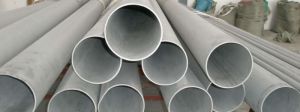
Stainless Steel Seamless 446 Pipes
M-Pipe & Fitting Solution Inc is a reputable company that manufactures and supplies high-quality stainless steel seamless 446 pipes. Stainless steel seamless 446 pipes offer a strong, dependable option. These pipes, which are of the ferritic family of stainless steels and are made of grade 446 stainless steel, are well known for their capacity to withstand heat. Grade 446 pipes have a high chromium content that offers exceptional oxidation resistance even at high temperatures, making them suited for usage in industries including chemical processing, petrochemical, power generation, and furnace equipment. These pipes provide a clean and uniform surface finish thanks to their seamless design, ensuring structural strength. For demanding applications where temperature and corrosion resistance are important considerations, stainless steel seamless 446 pipes are recommended. They are known for their adaptability, ease of manufacture, and low maintenance needs. The simplicity of production and installation of stainless steel seamless 446 pipes is another outstanding quality. They are simple to cut, shape, and weld to satisfy certain specifications, enabling bespoke designs and smooth integration into current systems. They are a favoured option for construction projects and retrofitting applications due to their adaptability and versatility. They are a top choice for various applications due to their superior heat resistance, corrosion resistance, mechanical qualities, and ease of production. These pipes offer a strong and long-lasting solution to fulfil modern industries’ stringent requirements, whether for chemical processing, power generation, or other industrial activities. ASTM A312 Seamless Pipes: Seamless, welded, and highly cold-worked austenitic stainless steel pipes are all covered under the ASTM A312 standard specification. It includes austenitic, ferritic, and duplex stainless steels and a broad range of pipe diameters and grades. Oil and gas, chemical, and food processing industries often employ ASTM A312 seamless pipes.It covers a variety of pipe diameters, schedules, and grades, including well-known stainless steel grades like 304, 316, and 321. Industries like oil and gas, chemical processing, pharmaceuticals, and food processing frequently employ these pipes. The ASTM A312 standard includes standards for testing, mechanical qualities, and other things. AISI 446 Stainless Steel Pipe: Ferritic stainless steel alloy AISI 446 is renowned for its outstanding resistance to high-temperature oxidation and corrosion. It has a high chromium content and only trace amounts of molybdenum, which help it withstand heat. Applications for AISI 446 stainless steel tubes include heat exchangers, exhaust systems, combustion chambers, and sections of furnaces. The mechanical qualities of these tubes can sustain temperatures of up to 1200 °C (2200 °F). A particular type of stainless steel from the ferritic family is designated as AISI 446. It offers exceptional resistance to corrosion and oxidation at high temperatures because of the high quantities of chromium and minor amounts of molybdenum it contains. In applications involving high-temperature conditions, such as furnace and heat exchanger components, AISI stainless steel seamless 446 pipes are frequently employed. ASTM A249 Steel Pipe: An industry standard for welded austenitic steel boilers, superheaters, heat exchanger, and condenser tubes is ASTM A249. It includes stainless steel tubes fabricated from all grades, including austenitic, ferritic, and duplex stainless steels. Steel pipes made to ASTM A249 are frequently used in heat transfer equipment in petrochemical, chemical processing, and power generation sectors. It applies to stainless steel tubes constructed from grades 304, 316, and 321. Many industries use these pipes extensively, including power generation, chemical processing, pharmaceuticals, and food processing. Dimensions, mechanical qualities, production processes, and non-destructive testing are all specified by ASTM A249. SS 446 Welded Pipes: Stainless steel grade 446, a ferritic, heat-resistant alloy, is referred to as SS 446. Stainless steel grade 446 is used to create SS 446 welded pipes by joining pieces of the material. These pipes are appropriate for use in furnace equipment, oil refineries, chemical plants, and other high-temperature situations because of their outstanding resistance to high-temperature corrosion and oxidation. Welded pipes offer strength, cost-effectiveness, and longevity compared to seamless pipes. Stainless steel grade 446, a ferritic alloy with high heat resistance, is referred to as SS 446. Stainless Steel Seamless 446 Pipes is used to create SS 446 welded pipes. These pipes are used in high-temperature-resistant applications such as furnace parts, exhaust systems, and chemical processing machinery. They are perfect for various sectors due to their seamless design and the remarkable qualities of grade 446 stainless steel. No matter what type of equipment you need—chemical processing, petrochemical, power generation, furnace equipment, etc.—stainless steel seamless 446 pipes provide the durability, dependability, and performance you need. For high-temperature and corrosion resistance applications, stainless steel seamless 446 pipes offer a dependable and strong option. These pipes offer outstanding performance and longevity due to their seamless design, great heat resistance, corrosion resistance, and ease of production. Even in the most demanding situations, stainless steel seamless 446 pipes offer effective and dependable operations in chemical processing, petrochemical, power generating, or furnace equipment. M-Pipe & Fitting Solution Inc provides certified Pipes & Tubes that meet international standards such as API, ASTM, and ISO 9001:2015.
Length : Standard 6-6.1 Meter Length,20 Ft,Custom Cut Lengths
Grade : 446 / 1.4762 / 3
Type : Seamless, Welded, Cold Drawn, Structural, Hot Finished, Extruded, Annealed & Pickled
Thickness : 0.4mm Up To 30.00 Mm, Schedules 5, 10S, 10, 30, 40S, 40, 80, 80S, XS, 160, XXH
...more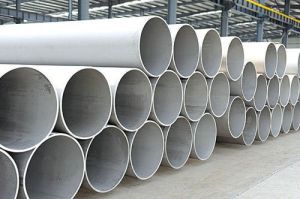
Stainless Steel Seamless 410 Pipes
M-Pipe & Fitting Solution Inc is a reputable company that manufactures and supplies high-quality Stainless Steel Seamless 410 Pipes. One kind of stainless steel pipe constructed exclusively from grade 410 stainless steel is called seamless stainless steel pipe. These pipes are ideal for various industrial applications thanks to their seamless design, high strength, and corrosion resistance. A form of stainless steel pipe produced particularly from grade 410 stainless steel is known as a seamless 410 pipe. These pipes are ideal for various industrial applications thanks to their seamless design, high strength, and corrosion resistance. Industries like oil and gas, petrochemical, chemical processing, power generation, automotive, and construction use these pipes extensively. They are used in demanding applications requiring superior strength, durability, and corrosion resistance. Stainless Steel Seamless 410 Pipes provide dependable performance whether they are carrying fluids, withstanding high temperatures, or repelling severe chemicals. Stainless Steel Seamless 410 Pipes are frequently subjected to heat treatment procedures such as annealing, quenching, and tempering to improve the mechanical properties and attain the appropriate hardness. These procedures optimize the material’s microstructure, enhancing its toughness and strength. 410 Welded Pipe: Grade stainless steel seamless 410 pipes produced through welding are called 410 welded pipes. Two or more steel components are joined to make the pipes using welding processes. Welded pipes are frequently utilized in applications where durability and cost-effectiveness are crucial considerations. Flat or spiral steel is normally formed into cylindrical shapes to create them. The edges are then joined together using a variety of welding processes, including submerged arc welding, TIG welding, and welding with tungsten inert gas. Welded pipes provide good strength for applications requiring high pressure or structural integrity. The pipe size, wall thickness, and intended application are only a few examples of the variables that affect the welding method selection. Because of their strength and dependability, welded pipes are ideal for applications requiring high pressure or structural integrity. They are extensively utilized by sectors of the economy like oil and gas, petrochemical, construction, and automotive. SS 410 ERW Pipe: Another name for 410 stainless steel pipes produced by the Electric Resistance Welding (ERW) method is SS 410 ERW pipe. Flat steel strips are formed into cylindrical shapes, and the edges are then joined to generate ERW pipes. These pipes are utilized extensively across numerous sectors and provide great dimensional precision. The steel strip or plate is heated to the necessary welding temperature using an electric current, and the edges are then welded together under pressure, resulting in an ERW pipe. SS 410 ERW pipes provide exceptional dimensional accuracy, high strength, and corrosion resistance. The ERW (Electric Resistance Welding) procedure. The steel strip or plate is heated to the necessary welding temperature using an electric current, and the edges are then welded together under pressure, resulting in an ERW pipe. Stainless steel seamless 410 pipes ERW pipes provide exceptional dimensional accuracy, high strength, and corrosion resistance. They come in various sizes and wall thicknesses to accommodate certain application needs. In sectors like chemical processing, food processing, pharmaceuticals, and water treatment, SS 410 ERW pipes are widely used. They are chosen because they are more affordable, simpler to install, and suitable for both high- and low-temperature applications. UNS S41000 Seamless Pipe: Seamless pipes constructed from this grade have no welding or joining seams and are referred to as UNS S41000 pipes. C seamless pipes must have smoother internal surfaces, greater strength, and improved corrosion resistance to be acceptable for critical applications. For use in sectors like oil and gas, chemical processing, and power production, seamless pipes are ideal because of their increased strength, heightened resistance to corrosion, and smooth inside surfaces. No welding or joining seams are present in the creation of UNS S41000 seamless pipes from this particular grade of stainless steel. In a procedure known as seamless pipe production, hollow tubes made from solid billets are extended and molded into the required shapes to generate seamless pipes. The excellent strength, corrosion resistance, and smooth internal surfaces of UNS S41000 seamless pipes make them the best choice for demanding applications. They are frequently employed in oil and gas exploration, chemical processing, energy production, and marine applications. For abrasive and demanding situations, UNS S41000 seamless pipes provide good resistance to oxidation, heat, and corrosion. ASTM A312 410 Pipe: ASTM A312 is a specification that covers seamless, welded, and highly cold-worked austenitic stainless steel pipe intended for high-temperature and generally corrosive operation. It was released by the American Society for Testing and Materials (ASTM). Pipes made of the stainless steel seamless 410 pipes that adhere to the specifications laid out in the ASTM A312 standard are referred to as ASTM A312 410 pipe. While most of the focus of ASTM A312 is on austenitic stainless steels, such as grades 304 and 316, it can also apply to some martensitic stainless steels, such as grade 410. Pipes produced of grade 410 stainless steel that adhere to the particular specifications listed in the ASTM A312 standard, such as measurements, mechanical characteristics, and testing criteria, are referred to as ASTM A312 410 pipe. While austenitic stainless steels like grades 304 and 316 are the main emphasis of ASTM A312, martensitic stainless steels like grade 410 may also fall under its purview. The term “ASTM A312 410 pipe” refers to pipes manufactured of the stainless steel grade 410 that satisfy the particular specifications listed in the ASTM A312 standard. These specifications cover size, mechanical characteristics, test standards, and chemical makeup. Chemical facilities, refineries, oil and gas processing, food processing, and other industries all employ ASTM A312 410 pipes in various applications. They are well-known for being extremely strong, having good corrosion resistance, and being suitable for situations with high temperatures. Stainless steel seamless 410 pipes provide a dependable solution. They are suitable for various industrial applications due to their seamless design and the excellent qualities of stainless steel seamless 410 pipes. These pipes can be customized to meet the needs of particular projects. They can be used in various industrial applications thanks to the wide range of sizes and dimensions available. Stainless Steel Seamless 410 Pipes provide dependable performance and durability whether conveying fluids, managing high-pressure environments, or operating in corrosive environments. Applying heat to these pipes optimizes their mechanical characteristics, enhancing their strength, toughness, and hardness. By doing this, the pipes are guaranteed to be long-lasting and reliable while enduring the demands of the intended application. M-Pipe & Fitting Solution Inc provides certified Pipes & Tubes that meet international standards such as API, ASTM, and ISO 9001:2015.
Length : Single Random,Double Random & Required Length
...more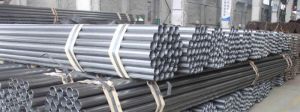
Stainless Steel Seamless 347H Pipes
M-Pipe & Fitting Solution Inc is a reputable company that manufactures and supplies high-quality stainless steel seamless 347H pipes. Stainless steel seamless 347H pipes are an altered variety of stainless steel 347, austenitic stainless steel that has been stabilized. The “H” in 347H refers to the material’s high carbon content, which improves its resistance to high-temperature conditions. Compared to normal 347 stainless steel, the higher carbon content enhances creep resistance and offers stronger tensile strength.The type of piping material known as stainless steel seamless 347H pipes has exceptional high-temperature strength, durability, and corrosion resistance. Petrochemical, chemical, oil and gas, power generating, and other sectors frequently employ these pipes. The corrosion resistance of stainless steel seamless 347H pipes is one of their main benefits. These pipes have good intergranular corrosion resistance, making them suitable for applications where exposure to corrosive environments is a concern. They are excellent for use in high temperature applications because they provide resistance to oxidation in high-temperature environments. The name “ASME SS 347H Seamless Pipes” designates seamless pipes constructed of stainless steel grade 347H that adhere to the specifications established by the American Society of Mechanical Engineers (ASME). Because they are produced using a seamless technique, the pipes have a smooth surface and good structural integrity. They are frequently used in numerous industrial applications that require corrosion resistance and high-temperature settings.In particular, stainless steel seamless 347H pipes, a modified variety of stainless steel 347, makes these seamless pipes. Because of the high carbon content in this grade, which is indicated by the “H” in 347H, it has better high-temperature strength and sensitization resistance. These seamless pipes are used in energy production, petroleum refining, and chemical processing. American Society of Mechanical Engineers (ASME) standards are followed in producing ASME SS 347H Seamless Pipes. In particular, stainless steel grade 347H, a modified variety of stainless steel 347, is used to make these pipes. The “H” in 347H represents the grade’s increased carbon content, increasing its high-temperature strength and sensitization resistance. These seamless pipes are used in power generating, oil refining, and chemical processing sectors because they are durable and offer high corrosion resistance. The standard specification for seamless, welded, and severely cold-worked austenitic stainless steel pipes is ASTM A312. Pipes made of stainless steel grade 347H that are seamless or welded to the requirements listed in the ASTM A312 standard are called “ASTM A312 347H Pipes”. These pipes are frequently employed in chemical processing, the oil and gas industry, and high-temperature settings. This specification includes austenitic stainless steel pipes that have been substantially cold-worked, welded, and seamless. The stainless steel grade 347H used to make the 347H pipes is produced following this standard. These pipes are frequently employed in fields where high-temperature and corrosion resistance are necessary, such as the oil and gas, chemical processing, and pharmaceutical industries. The phrase “ASTM A312 347H Pipes” designates pipes produced from stainless steel grade 347H that meet the requirements stated in the ASTM A312 standard. To meet the needs of various applications, these pipes are offered in seamless and welded forms. Oil and gas, chemical processing, pharmaceuticals, and other sectors extensively use ASTM A312 347H pipes. They are renowned for their outstanding corrosion resistance, high-temperature strength, and longevity. In many industrial processes, these pipes are frequently utilized to transport liquids, chemicals, and gases. Pipes that comply with ASTM A554 347H standard specification for welded stainless steel mechanical tubing are ASTM A554. “ASTM A554 347H Pipes” describes welded pipes constructed of stainless steel seamless 347H pipes that meet the specifications listed in the ASTM A554 standard. These pipes are generally employed for structural and ornamental purposes in architectural applications, railings, and artistic furniture. The 347H pipes built by this specification are combined using methods like TIG or laser welding. They are frequently used in architectural applications where aesthetic appeal and corrosion resistance are crucial, such as handrails, balustrades, and decorative furniture. Welded mechanical tube pipes made of stainless steel are known as ASTM A554 347H Pipes. For these pipes, which are generally employed for structural and decorative purposes, the ASTM A554 standard specifies certain specifications. The 347H pipes made following this specification are joined using methods like TIG or laser welding. They are frequently used in architectural contexts, including handrails, balustrades, and decorative furniture, where aesthetic appeal and corrosion resistance are essential consideration. The phrase “ASME SA554 347H Pipes” refers to welded stainless steel pipes constructed from grade 347H in line with the specifications specified by the ASME SA554 specification. These pipes are employed where corrosion resistance and structural integrity are crucial, such as in the petrochemical, food-processing, and architectural sectors. The phrase “ASME SA554 347H Pipes” refers to welded stainless steel pipes constructed from grade 347H in line with the specifications specified by the ASME SA554 specification. These pipes are employed where corrosion resistance and structural integrity are crucial, such as in the petrochemical, food-processing, and architectural sectors. Welded stainless steel pipes made to the American Society of Mechanical Engineers (ASME) SA554 specification are known as ASME SA554 347H Pipes. These pipes meet the requirements stipulated in the ASME SA554 standard and are specifically constructed from stainless steel seamless 347H pipes. SA554 347H by ASME Pipes is widely employed in various industries, including petrochemical, food processing, and construction. They are frequently used when corrosion resistance, strength, and durability are necessary. These pipes are welded to make a solid, dependable junction that ensures continued performance in various challenging settings. These pipes’ seamless production method produces a homogeneous and smooth surface with no welded connections. As a result, the pipes are structurally sound and free from leaks and weak spots, making them extremely trustworthy for demanding applications. The absence of welds also enhances the pipes’ overall aesthetic appeal, making them suitable for ornamental and architectural uses. Because they come in various sizes, stainless steel seamless 347H pipes can be utilized in various applications. These pipes provide remarkable versatility and adaptability, whether used to convey fluids, gases, or other substances in industrial operations or act as structural components in architectural projects.Stainless Steel Seamless 347H Pipes also provide remarkable high-temperature strength and thermal cycling resistance. They are perfect for applications with high temperatures, such as in the petrochemical, power generating, and heat exchanger industries, because they can resist intense temperatures without losing their mechanical qualities. M-Pipe & Fitting Solution Inc provides certified Pipes & Tubes that meet international standards such as API, ASTM, and ISO 9001:2015.
...more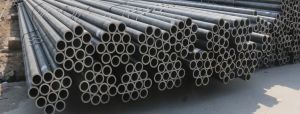
Stainless Steel Seamless 347 Pipes
M-Pipe & Fitting Solution Inc is a reputable company that manufactures and supplies high-quality stainless steel seamless 347 Pipes. The pipes are constructed from stainless steel alloy 347, austenitic stainless steel that has been stabilized. Columbium (niobium) and tantalum are present, which aid in preventing intergranular corrosion. Excellent corrosion resistance is provided by stainless steel 347 pipes, especially in high-temperature settings. They are excellent for various industrial applications because they can tolerate oxidation and intergranular corrosion. Because the seamless pipes were created without any welded seams or join. This construction technique improves the pipes’ strength, integrity, and leak resistance. Applications at High Temperatures: Stainless Steel Seamless 347 Pipes are specially made to handle applications at High Temperatures. Without losing their mechanical qualities, they can resist temperatures of up to 800-900 degrees Celsius (1470-1650 degrees Fahrenheit) Chemical processing, oil and gas, refineries, petrochemicals, power generation, heat exchangers, boilers, and other sectors use stainless steel 347 pipes. They are frequently employed for moving fluids and gases in hot, corrosive environments.Three hundred forty-seven seamless stainless steel pipes make fabrication and installation simple. They are easily shaped, welded, and machined to fit project specifications, enabling specialized designs and easy integration into current systems. They are useful for various applications, including pipelines, heat exchangers, and fluid handling systems, because of their adaptability and versatility.stainless steel seamless 347 pipes are a dependable and effective option for industries that demand robust pipeline solutions due to their superior corrosion resistance, high-temperature strength, and ease of manufacturing. Industrial systems’ durability and effectiveness are ensured by their capacity to tolerate challenging conditions, such as extreme temperatures and corrosive substances. AISI 347 Pipes: The stainless steel grade designated by AISI 347. This stainless steel grade makes AISI (American Iron and Steel Institute) 347 pipes. Columbium (niobium) and tantalum stabilize AISI 347, providing outstanding high-temperature corrosion resistance. It has exceptional mechanical qualities and great resistance to high-temperature oxidation and intergranular corrosion. Applications involving high-temperature conditions, such as furnace equipment, chemical processing, and aerospace industries, frequently use AISI 347 pipes. This alloy is well suited for various demanding applications since it is specifically created to give outstanding resistance to intergranular corrosion and high-temperature oxidation.Columbium (niobium) and tantalum additives to the AISI 347 alloy stabilize the metal and stop sensitization during welding or exposure to high temperatures. To its stabilization, the alloy can better preserve its structural integrity, mechanical strength, and corrosion resistance, even in difficult settings. SS UNS S34700 Pipe: Stainless steel alloy 347 with the UNS (Unified Numbering System) code S34700 is called SS UNS S34700 pipe. It is an austenitic stainless steel alloy with improved intergranular corrosion resistance. It is an intergranular corrosion-resistant stabilized stainless steel grade. The pipes constructed from this particular grade of stainless steel are called UNS S34700. This marking ensures that stainless steel complies with industry requirements and identifies the precise composition of the material. Because of their comparable characteristics, AISI 347 and UNS S34700 are frequently interchanged. ASTM A358 Stainless Steel: Stainless steel pipe suited for high-temperature or corrosive duty can be electric-fusion welded using ASTM A358 stainless steel, a specification from the American Society for Testing and Materials (ASTM). It contains various stainless steel grades, such as the 347. the specification refers to austenitic chromium-nickel stainless steel pipe for high-temperature or corrosive duty that is electric-fusion-welded (EFW). Stainless Steel Seamless 347 Pipes is one of the several grades of stainless steel that are included in it. Pipes made of stainless steel ASTM A358 are frequently used in industries including petrochemical facilities, chemical processing, and energy production.Electric fusion welding creates these stainless steel pipes, producing a robust, long-lasting junction. They are frequently used in challenging applications, including petrochemical plants, power generation facilities, and chemical processing plants, where corrosion resistance and high-temperature environments are essential. ASTM A213 TP 347 Stainless Pipe: Stainless steel pipes meeting the requirements of ASTM A213 are seamless boiler, superheater, and heat-exchanger tubes made of ferritic and austenitic alloy steel. The specific stainless steel grade, AISI 347, is called TP 347. A seamless pipe constructed of stainless steel seamless 347 pipes is what ASTM A213 TP 347 stainless pipe denotes. Boiler, superheater, and heat-exchanger tubes made of seamless ferritic and austenitic alloy steel are covered by the ASTM A213 specification. The specific stainless steel grade, AISI 347, is called TP 347. Heat exchangers, petrochemical facilities, refineries, and other high-temperature applications frequently employ ASTM A213 TP 347 stainless pipe, a seamless pipe manufactured of stainless steel 347. The specific stainless steel grade, AISI 347, is called TP 347. A seamless pipe constructed of stainless steel 347 is what ASTM A213 TP 347 stainless pipe denotes. Industries like refineries, petrochemical facilities, power generators, and heat exchangers frequently use these seamless pipes. They offer remarkable resilience to high-temperature environments and have the strength to endure the corrosive applications’ demanding circumstances. Industries like chemical processing, oil and gas, refineries, petrochemicals, power generation, and heat exchangers employ stainless steel seamless 347 pipes extensively. They work in tough environments with high temperatures, corrosive materials, and difficult operating conditions to carry a variety of fluids and gases. These pipes provide dependable performance and long-term endurance, transporting corrosive chemicals, steam, or high-temperature gases. Excellent corrosion resistance, high-temperature capability, and seamless construction are all features of stainless steel seamless 347 pipes. Its use assures reliable and effective fluid and gas conveyance in industries where corrosion resistance and high-temperature tolerance are essential. For demanding applications, stainless steel seamless 347 pipes offer a strong and affordable alternative thanks to their inherent strength, integrity, and endurance. M-Pipe & Fitting Solution Inc provides certified Pipes & Tubes that meet international standards such as API, ASTM, and ISO 9001:2015.
...more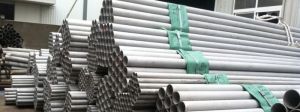
Stainless Steel Seamless 321H Pipes
M-Pipe & Fitting Solution Inc is a reputable company that manufactures and supplies high-quality Stainless Steel Seamless 321H Pipes. Compared to ordinary Stainless steel 321H, the austenitic stainless steel alloy 321H has a higher carbon concentration. 321H generally contains 17 to 19% chromium, 9 to 12% nickel, 0.08% to 2% carbon, 0.75% to 0.75% silicon, 0.045% to 0.045% phosphorus, and 0.03% to 0.03% sulfur.Stainless steel seamless 321H pipes come in various lengths, wall thicknesses, outer diameters (OD), and other sizes and dimensions. Standard diameters for these pipes are normally available following the industry’s ASTM, ASME, and DIN requirements. Without losing their mechanical qualities, these pipes can resist temperatures as high as 900 °C (1652 °F). This qualifies them for uses that need continuous exposure to high temperatures, such as in heat exchangers, furnace parts, and exhaust systems.Oil and gas, pharmaceuticals, food processing, power generation, petrochemicals, chemical processing, and stainless steel seamless 321H pipes are just a few industries that use these pipes. They are frequently employed for fluid and gas transportation in corrosive and hot settings. ASME SS 321H Pipes: ASME is short for the American Society of Mechanical Engineers, which develops norms and regulations for various sectors. The designation ASME SS 321H tubing signifies that the tubing complies with ASME standards and is manufactured of the stainless steel alloy 321H. Applications where high-temperature resistance, corrosion resistance, and structural integrity are necessary often call for tube usage. The stainless steel alloy 321H, a high-carbon variation of the 321 stainless steel grade, is used to make the tubing. Heat exchangers, refineries, and power plants are examples of high-temperature situations where ASME SS 321H tubing performs exceptionally well. It is useful for various applications because of its corrosion and oxidation resistance. The stainless steel alloy 321H, an austenitic stainless steel variety with a higher carbon content than standard stainless steel seamless 321H pipes, is used to make the tubing. Higher carbon content makes better high-temperature strength and creep resistance possible. Due to its high oxidation and corrosion resistance level, ASME SS 321H tubing suits high-temperature situations. It is widely used in chemical processing, refineries, power plants, and heat exchangers. AISI 321H Stainless Steel: The American Iron and Steel Institute, or AISI, identifies and categorizes various steel grades. Stainless Steel Seamless 321H Pipes, as described by AISI standards, is referred to as AISI 321H stainless steel. Compared to standard grade 321 stainless steel, it is an austenitic stainless steel with increased carbon content. Greater carbon content makes improvements in high-temperature strength and creep resistance possible. The greater carbon content provides improved creep resistance and high-temperature strength. Due to its outstanding resistance to intergranular corrosion, AISI 321H stainless steel is suited for applications involving exposure to sensitizing temperatures. This alloy is frequently utilized in chemical processing, aerospace, and automotive sectors, where corrosion resistance and high-temperature performance are essential. High-quality stainless steel alloy AISI 321H offers exceptional high-temperature performance and corrosion resistance. AISI 321H stainless steel provides improved strength and stability in applications where exposure to high temperatures is a concern because of its higher carbon content. It is especially well-suited in applications requiring resistance to intergranular corrosion, such as furnace components, exhaust systems, and thermal processing equipment. Aerospace, automotive, and chemical processing industries extensively use AISI 321H stainless steel. 321H Stainless Steel Welded Pipe: Welded 321H stainless steel pipes are formed by joining stainless steel alloy 321H together. Using various welding procedures, two ends of a steel strip or plate are joined to create welded pipes. As a result, a long, uninterrupted pipe with welded seams is produced. In applications requiring corrosion resistance and high-temperature strength, such as industrial piping systems, 321H stainless steel welded pipes are frequently utilized. These pipes’ use of welding assures a solid and long-lasting link. Compared to seamless pipes, welded pipes provide lower cost, simpler customization, and higher pressure tolerance. Welded pipes made of 321H stainless steel transfer fluids and gases in several industries, including petrochemicals, power generation, and oil and gas. Applying welding procedures, two ends of stainless steel strips or plates are joined to create 321H stainless steel welded pipe. Due to their renowned strength and longevity, these pipes suit applications involving high pressures and corrosive environments. They are widely employed in the oil and gas, petrochemical, and power generation industries for the transportation of fluids and gases. Welded pipes made of stainless steel seamless 321H pipes offer a practical option with outstanding corrosion resistance in high-temperature settings. ASTM A312H: This pipe is made of austenitic stainless steel and is intended for use in high-temperature and corrosive environments. Oil and gas, chemical processing, and power generation frequently employ stainless steel pipes that adhere to ASTM A312H specifications. The ASTM A312H specification guarantees that the stainless steel pipes meet particular dimensional, mechanical, and chemical specifications. Due to their superior corrosion resistance, high-temperature strength, and mechanical characteristics, ASTM A312H stainless steel pipes are utilized extensively across various industries. These pipes are made with exact measurements and undergo rigorous testing to ensure they match the criteria. Industries include food processing, pharmaceuticals, pulp & paper, and chemical processing using ASTM A312H stainless steel pipes.Due to their exceptional mechanical, high-temperature, and corrosion-resistant qualities, these pipes are extensively employed in various industries. To ensure compliance with the criteria, ASTM A312H stainless steel pipes are fabricated with accurate dimensions and put through rigorous testing. They have uses in the food processing, pharmaceutical, pulp and paper, and chemical processing sectors. Stainless Steel Seamless 321H Pipes are a great option for various industrial applications that call for high-temperature resistance, corrosion resistance, and structural integrity. Stainless steel alloy 321H, which has a higher carbon content than stainless steel grade 321 standard, is used to make these pipes. The higher carbon content results in enhanced strength and creep resistance at high temperatures. To ensure that the pipes fulfill the requirements and standards for your particular application, it is crucial to seek advice from a reliable supplier or manufacturer when considering stainless steel seamless 321H pipes. You may take advantage of stainless steel seamless 321H pipes’ remarkable high-temperature performance, corrosion resistance, and long-term durability, eventually improving your industrial processes’ efficiency and dependability. M-Pipe & Fitting Solution Inc provides certified Pipes & Tubes that meet international standards such as API, ASTM, and ISO 9001:2015
...more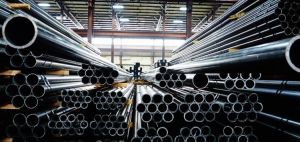
Stainless Steel Seamless 321 Pipes
M-Pipe & Fitting Solution Inc. is a reliable business that makes and sells high-quality stainless steel seamless 321 pipes. Stainless Steel Seamless 321 Pipes have changed the way the industry works because they have a great mix of performance, longevity, and corrosion resistance. Because of their great qualities, these pipes made from SS UNS S32100 have become very famous in many different industries. How Stainless Steel Is Made No Welds on 321 Pipes Stainless Steel Seamless 321 Pipes are made of an alloy of iron, chromium, and nickel. The carbon level is kept stable by adding titanium. Even after being exposed to high temperatures, 321 stainless steel has a high resistance to intergranular rust because of how it is made. Because of how they are made, these pipes are perfect for use in high-temperature industries like petrochemical, aircraft, and power generation. Pipes and tubes made from SS 321 UNS S32100 are made well. When making Stainless Steel Seamless 321 Pipes, high-quality raw materials are used. This makes sure that the finished product meets international quality standards. The pipes are made using a process called “seamless extrusion.” In this method, the raw materials are heated and pulled through a die to get the shape and size that is needed. This means that the pipes have perfect measurements and a smooth finish, which improves their total performance even more. ASME SS 321 seamless pipes have strength and dependability that can’t be beaten. The ASME SS 321 Seamless Pipes are a great choice for critical uses in many different industries because they are both strong and reliable. The building is seamless, so there is no chance of leaks or weak spots. This makes sure that fluids or gases can flow safely and effectively. Also, because these pipes have high tensile strength, they can be used to move things that are under a lot of pressure. ASTM A358 Seamless Pipes: The Best in Versatility The ASTM A358 seamless pipes made from Stainless Steel 321 are very versatile because they can be used in a wide range of situations. Whether they are used in chemical processing, medicines, food, and beverage, or architecture, these pipes can handle harsh conditions like corrosive environments, acidic substances, and high temperatures. Their ability to fight oxidation and scaling makes them last longer and makes sure they work well for a long time. SS 321 Welded Pipes: Strong Connections Made Without Gaps Even though smooth pipes are better in many ways, there are times when SS 321 Welded Pipes are better. Welded pipes are made by melting the sides of two or more stainless steel sheets or strips together to make a strong, continuous joint. This welding process makes the pipe more stable and allows for more customization, so makers can make pipes in different shapes and sizes to fit the needs of different projects. Where SS Seamless 321 Pipes Shine in Their Uses Stainless Steel Seamless 321 Pipes can be used for many different things because of how they are made. In the chemical and petroleum industries, where they handle a wide range of corrosive chemicals and gases, these pipes are used a lot. The aerospace industry uses them in airplane exhaust systems and engine parts because they work well at high temperatures. Also, SS 321 seamless pipes are often used in power plants to move steam and other fluids with high temperatures efficiently and safely. The Good Things About Seamless 321 Stainless Steel Pipes Many things make Stainless Steel Seamless 321 Pipes better than other materials. Their high resistance to corrosion makes them last longer, even in harsh environments, which saves money on upkeep and cuts down on downtime. Because the lines can handle high temperatures and pressure, they can be used in important situations. Also, their smooth surfaces reduce frictional losses, which saves energy and makes processes more efficient. Maintenance and care: Making sure things last Proper care is important if you want Stainless Steel Seamless 321 Pipes to last as long as possible. To keep toxic substances or contaminants from building up, things need to be checked and cleaned regularly. Using the right coats can make pipes more resistant to certain chemicals or agents that cause corrosion, which will make them last even longer. By following the manufacturer’s instructions and best practices in the business for maintenance, the pipes will work well for the rest of their lives. In the end, Stainless Steel Seamless 321 Pipes are a sign of how far material science and engineering have come. They are the epitome of longevity and dependability because of how they are made, what they are made of, and how well they work. These pipes have been put to the test in a wide range of settings, from critical uses in the aerospace and power generation industries to daily uses in chemical processing and building projects. As technology keeps getting better, Stainless Steel Seamless 321 Pipes will continue to be an important part of modern industrial uses. They can handle even the toughest situations with ease. M-Pipe & Fitting Solution Inc offers certified Pipes & Tubes that meet international standards like API, ASTM, and ISO 9001:2015.
...more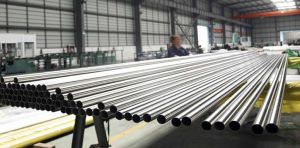
Stainless Steel Seamless 317L Pipes
M-Pipe & Fitting Solution Inc is a reputable company that manufactures and supplies high-quality Stainless Steel Seamless 317L Pipes. Stainless steel seamless 317L pipes are a preferred choice in many industries. These pipes were made with corrosive situations in mind, where other materials could not perform as needed. The 317L pipes’ capacity to tolerate extreme temperatures is an important additional quality. These pipes can retain their mechanical qualities and corrosion resistance even at high temperatures. This qualifies them for use with heat exchangers, machinery for chemical processing, and components of furnaces.A seamless manufacturing procedure, which eliminates all weld seams, is used to create stainless steel seamless 317L pipes. The weak areas often connected with welded pipes are eliminated by seamless construction. Ensuring a smooth internal surface reduces the possibility of contamination or particle entrapment, increases fluid flow, and maximizes safety. When opposed to welded pipes, seamless pipes are stronger and more long-lasting. They are frequently used in the pulp and paper, pharmaceutical, food, oil and gas, chemical and petrochemical processing, and oil and gas sectors. Corrosive liquids, gases, and liquids at high temperatures can all be moved through these pipes. SS S31703 ERW Pipe: An austenitic stainless steel with a low carbon content known as 317L is given the UNS number S31703. Electric Resistance Welded, or ERW, is a designation for the welding procedure used to make pipes, according to its name. Stainless steel is denoted by the letter “S” in the designation SS S31703, and this particular grade is designated by the number 31703 in the UNS. Because it has a low carbon content and an austenitic structure, Stainless Steel Seamless 317L Pipes offers high corrosion resistance in a variety of conditions as well as better resistance to sensitization. In creating ERW (Electric Resistance Welded) pipes, an electric current is passed through metal to generate heat that melts the edges of a strip or plate to make a solid pipe. Strong, durable, and reasonably priced, ERW pipes provide good dimensional accuracy. The S31703 ERW Pipe is created using “electric resistance welding,” or ERW. Stainless steel is shaped into a cylindrical shape using a succession of rollers during the ERW process. The metal is then subjected to an electric current, which produces heat and causes the metal’s edges to fuse to form a solid pipe. Good dimensional accuracy, great strength, and cost-effectiveness are only a few benefits of this welding technique. 317L SS Welded Pipes: 317L SS Welded Stainless steel pipes manufactured from 317L grade stainless steel are known as welded pipes. These pipes are made by joining two ends of a steel strip or plate using various welding techniques, including laser welding, TIG welding, and welding with metal inert gas. The pipe’s strength and structural integrity are provided by the welded connections. Two ends of a stainless steel strip or plate are joined together to create these pipes using a variety of welding processes. Depending on the requirements and industry norms. The welding technique may involve TIG (Tungsten Inert Gas), MIG (Metal Inert Gas), or laser welding. Because of their strength and longevity, welded pipes are frequently used in various applications, including those in the chemical processing, oil and gas, food processing, and pharmaceutical industries. Additionally, ERW pipes made of Stainless Steel Seamless 317L Pipes offer outstanding corrosion resistance and are suitable for use in various industries. In addition to others, they are frequently utilized in the pharmaceutical, oil and gas, food processing, and chemical processing industries. These pipes’ welded connections offer strength and dependability, making them suitable for moving fluids and gases. ASTM A269 SS Pipes is a standard specification for seamless and welded austenitic stainless steel tubing. It includes 317L and other stainless steel grades. Therefore, stainless steel pipes that adhere to the ASTM A269 requirements are called ASTM A269 SS pipes. These pipes are employed in various settings, including corrosive and high-temperature ones. This specification includes 317L among the grades of stainless steel it covers. The dimensional accuracy, mechanical characteristics, and corrosion resistance of ASTM A269 SS pipes are guaranteed by conformance to the precise requirements listed in the standard. These pipes are employed in various applications, including general fluid handling, instrumentation, hydraulic systems, and heat exchangers. The specifications listed in the standard, including those for size, mechanical characteristics, and corrosion resistance, are all met by ASTM A269 SS pipes. It guarantees the pipes’ dependability and quality for common service applications. Heat exchangers, instrumentation, hydraulic systems, and general-purpose fluid handling all require 317L stainless steel pipes that conform to ASTM A269. UNS S31703 Pipe: UNS S31703 is the 317L stainless steel’s Unified Numbering System (UNS) designation. The UNS system is used all around the world to identify different materials. As a result, UNS S31703 Pipe is a pipe manufactured of 317L stainless steel. The Unified Numbering System (UNS) code for 317L stainless steel is UNS S31703. The UNS system offers a reliable and well-known naming scheme for many materials. Because Stainless Steel Seamless 317L Pipes offers superior corrosion resistance, high-temperature strength, and resistance to sensitization, a pipe marked UNS S31703 Pipe is constructed from it. In sectors including chemical processing, pharmaceuticals, pulp and paper, and power generation, where corrosion resistance and high-temperature performance are essential, UNS S31703 pipes are frequently utilized. These pipes’ seamless construction guarantees a smooth flow while minimizing pressure loss and lowering the possibility of leaks. They are, therefore, perfect for demanding applications where the safety of the fluid or gas being conveyed is crucial.Chromium, nickel, and molybdenum are among the components that give Stainless Steel Seamless 317L Pipes its exceptional corrosion resistance, especially in acidic and chloride-containing conditions. This qualifies it for use in chemical and petrochemical production processes, where exposure to corrosive materials is frequent. A solid option for enterprises needing strong and corrosion-resistant piping solutions is stainless steel seamless 317L pipes. They are suitable for various applications due to their combination of corrosion resistance, high-temperature performance, and weldability, assuring efficient and dependable fluid and gas transfer.M-Pipe & Fitting Solution Inc provides certified Pipes & Tubes that meet international standards such as API, ASTM, and ISO 9001:2015.
...more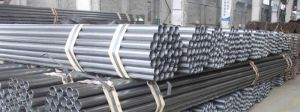
Stainless Steel Seamless 317 Pipes
M-Pipe & Fitting Solution Inc is a reputable business that makes and sells high-quality Stainless Steel Seamless 317 Pipes. Stainless Steel Seamless 317 Pipes are a kind of stainless steel pipe that is known for its great strength and resistance to corrosion. Grade 317 stainless steel is used to make these pipes. It is an austenitic stainless steel alloy with higher amounts of chromium, nickel, and molybdenum than other stainless steel grades. The high amount of chromium and molybdenum in grade 317 stainless steel makes it very resistant to chemicals, acids, and chlorides, as well as a wide range of other corrosive conditions. Because of this, these pipes can be used in many different industries, such as the chemical, oil and gas, pharmaceutical, and food preparation industries. There are different sizes, thicknesses, and lengths of Stainless Steel Seamless 317 Pipes to meet the needs of different applications. They can be made to look better and protect against rust even more by having their surfaces polished or pickled. These pipes come in different sizes, from small tubes to big pipes, so they can be changed to fit the needs of different projects. Because they come in different wall thicknesses and lengths, they are easy to create and put together. When picking stainless steel seamless 317 pipes, it’s important to think about things like the operating conditions, the pressure requirements, the temperature range, and the compatibility with the medium being moved. Proper installation and upkeep are also needed to make sure that the piping system works well and lasts for a long time. SS 317 Welded Pipes: SS 317 is a type of stainless steel grade 317 that has less carbon in it. This material makes lines that are strong and don’t rust when they are welded together. They are often used in many businesses, like making chemicals, making food, and making medicines. 317 Welded Pipes: SS 317 is a type of Stainless Steel Seamless 317 Pipe that has less carbon. This material makes lines that are strong and don’t rust when they are welded together. They are often used in many fields, like the chemical, food, and drug businesses. On the other hand, SS 317 welded tubing is made by welding together two or more pieces of stainless steel. The welding process makes a strong, long-lasting part that can be used in situations where strength and dependability are very important. The low amount of carbon in Grade 317 reduces the chance of sensitization and intergranular corrosion, which makes this tube very immune to corrosion in welds. Pipes made of grade Stainless Steel Seamless 317 have the “UNS” number S31700. UNS S31700 seamless pipes are very resistant to high heat and corrosion. They are used to move liquids or gases in places where a uniform structure is needed. UNS S31700 seamless pipe is a continuous tube made of 317-grade stainless steel. The “UNS” is the “Uniform Numbering System.” Grade 317 is the label. People know that these seamless tubes are very resistant to pitting, crevices, and general corrosion in a wide range of settings. They are often used in businesses like chemical processing, petrochemicals, oil and gas, and making power. UNS S31700 seamless tube is seamless tubing made of stainless steel with a grade of 317. The UNS S31700 number ensures that the tubing meets certain standards for its chemical composition and mechanical properties. This means that it can be used in a wide range of industrial settings. These tubes are often used in businesses like making chemicals, oil and gas, making food, and making medicines. A790 317 stainless steel: A790 is the ASTM number for ferritic/austenitic stainless steel tubing that is both smooth and welded. The term “A790 317 stainless steel” refers to tubes made from austenitic stainless steel grade 317 that contains molybdenum. These tubes are very strong and resistant to corrosion so they can be used in a wide range of harsh settings. ASTM A790 is the Standard Specification for Seamless and Welded Ferritic/Austenitic Stainless Steel Tubing. A790 Stainless Steel 317 is a name for stainless steel tubing that meets the standards of ASTM A790. These tubes are made of 317-grade stainless steel, which is strong, doesn’t rust, and can be welded. They are often used to look for oil and gas underwater, process chemicals, and remove salt from water. A790 317 stainless steel is tubing made of stainless steel that meets the standards set by ASTM A790. This specification is for ferritic/austenitic stainless steel tubing that is seamless or welded and will be used in general corrosion uses. A790 317 stainless steel tube can be used in chemical plants, power plants, and offshore platforms because it resists corrosion well, is strong, and is easy to weld. ASTM A312 317 Stainless Steel: ASTM A312 is the Standard Specification for Seamless, Welded, and Severe Cold-Worked Austenitic Stainless Steel Tubing. ASTM A312 317 Stainless Steel Tubing is made from grade 317 and meets the standards of the ASTM A312 standard. In the oil and gas, chemical processing, and power generation businesses, these tubes are often used. ASTM A312 317 Stainless Steel means Stainless Steel Seamless 317 Pipes that meet the ASTM A312 standards. ASTM A312 is the Standard Specification for Seamless, Welded, and Severe Cold-Worked Austenitic Stainless Steel Tubing. People use these tubes for a lot of different things, like processing food, making medicines, making paper, and cleaning up trash. It can stand up to rust, high temperatures, and deposits very well. The specification is for austenitic stainless steel tubing that is seamless, welded, and very cold-worked. It is used in high-temperature and corrosion-protection uses. ASTM A312 317 stainless steel tubing is used a lot in pulp and paper, medicines, petrochemicals, and wastewater treatment plants. Stainless Steel Seamless 317 Pipes, which includes Welded SS 317L Tubing, UNS S31700 Seamless Tubing, A790 317 Stainless Steel, and ASTM A312 317 Stainless Steel, is a grade 317 stainless steel tubing with great durability and corrosion resistance that is used in many industries. Increase. Seamless or welded construction ensures that the pipes are strong and reliable, and allow liquids or gases to move smoothly. They can be used in harsh environments and important applications because they are strong, don’t rust, and are the right size. Because these tubes are made without any seams, they have a stronger structure and no weak spots like you might find in soldered tubes. They are made by extruding solid billets into tubes with smooth, continuous walls of the same width and exact measurements. Pipes and tubes from M-Pipe & Fitting Solution Inc. are certified to meet foreign standards like API, ASTM, and ISO 9001:2015.
...more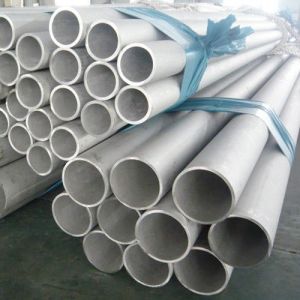
Stainless Steel Seamless 316Ti Pipes
M-Pipe & Fitting Solution Inc is a reputable company that manufactures and supplies high-quality Stainless Steel Seamless 316Ti Pipes. 316Ti stainless steel, a titanium-stabilized variation of grade 316 stainless steel, is used to create the premium seamless 316Ti stainless steel pipes. These pipes lack any welded seams or connections because they are the result of a seamless manufacturing process. Increased strength, higher corrosion resistance, and enhanced performance are just a few benefits of this seamless construction. It guarantees a smooth and continuous flow of gases or liquids, making them reliable for various industrial applications. The absence of welded seams also improves the pipes’ endurance and structural integrity, enabling them to handle high-pressure situations. Wide-ranging industries, such as chemical processing, oil and gas, food and beverage, pharmaceuticals, and construction, use Stainless Steel Seamless 316Ti Pipes. They are highly sought after for their corrosion resistance, high-temperature performance, and durable construction.316Ti seamless stainless steel pipes are used in a variety of industries. They are frequently used in naval applications, pharmaceutical industries, food processing, chemical equipment, heat exchangers, and condensers. They are suitable for high-temperature and high-pressure situations due to their adaptability. High-temperature stability, corrosion resistance, and adaptability in various industries are all features of stainless steel seamless 316Ti pipes. These pipes are dependable for demanding applications where dependability and performance are crucial due to their smooth design and longevity. A form of pipe made by welding stainless steel grade is known as a Stainless steel 316Ti Welded Pipe. This particular grade is a titanium-stabilized variation of 316 stainless steel that increases sensitization and corrosion resistance. The welding procedure unites the edges of stainless steel strips or plates to produce a continuous structure. These welded pipes have high strength and endurance, making them perfect for various applications in sectors like chemical processing, oil and gas, and food processing. In situations where both high corrosion resistance and strength are required, stainless steel 316Ti welded pipe is frequently employed. The welding procedure entails employing different methods, such as TIG (Tungsten Inert Gas) or MIG (Metal Inert Gas) welding, to attach the edges of stainless steel strips or plates. The finished welded pipe has strong structural integrity and can be used in chemical processing, oil and gas, pulp and paper, and desalination plants. The stainless steel pipe with the UNS S31703 stainless steel pipe. Compared to typical austenitic stainless steels, this grade has higher concentrations of chromium, nickel, and molybdenum, which provide superior corrosion resistance. “Unified Numbering System,” an internationally accepted classification for diverse materials, is what the abbreviation UNS stands for. A low-carbon, high-alloy stainless steel with improved corrosion resistance, UNS S31703 stainless steel pipe is also referred to as 317L stainless steel pipe. Compared to typical austenitic stainless steel, it has higher chromium, nickel, and molybdenum concentrations. UNS S31703 is suitable for use in chemical processing, pharmaceuticals, food processing, and marine environments due to its good resistance to corrosive chemicals, acids, and chloride conditions. The term “ASME SS 316TI Seamless Pipe” designates a stainless steel seamless pipe that satisfies the requirements established by the American Society of Mechanical Engineers (ASME). The quality, reliability, and safety of the materials used in diverse industries are all guaranteed by ASME standards. For applications requiring high flow rates, high pressure, or hygienic conditions, seamless pipes are made without any welded connections, resulting in a smooth internal surface. Industries like oil and gas, chemical processing, and power generation frequently use ASME SS 316Ti seamless pipes. The term “ASME SS 316Ti seamless pipe” designates a Stainless Steel Seamless 316Ti Pipes that satisfies the requirements established by the American Society of Mechanical Engineers (ASME). Materials and products used in diverse industrial applications are of the highest possible quality, dependability, and safety, thanks to ASME standards. The pipe’s seamless design guarantees a smooth and continuous surface, which is advantageous for applications demanding high pressure and leak-free performance. The American Society for Testing and Materials (ASTM) has a specification for welded austenitic steel boilers, superheaters, heat exchangers, and condenser tubes called ASTM A249 steel pipe. This specification includes 316Ti among the stainless steel grades it covers. The ASTM A249 standard specifies the pipes’ production process, size, mechanical properties, and testing methods to ensure that these pipes are suitable for particular industrial uses. The American Society for Testing and Materials (ASTM) has a specification for welded austenitic steel boilers, superheaters, heat exchangers, and condenser tubes called ASTM A249 steel pipe. The 316Ti grade of stainless steel is included in the ASTM A249 standard for stainless steel. These pipes were created with high-temperature and high-pressure situations in mind. In the heating, ventilation, air conditioning (HVAC), power generation, and petrochemical industries, they are frequently employed in heat exchangers, boilers, and condensers. Stainless Steel Seamless 316Ti Pipes makes extremely dependable and adaptable seamless pipes. These pipes provide excellent corrosion resistance, especially in settings with high levels of acid and chloride. Thanks to the titanium addition, they demonstrate improved resistance to sensitization at high temperatures, making them suitable for applications involving high heat. These pipes’ seamless design guarantees a continuous, smooth surface, reducing the possibility of leaks and delivering exceptional strength and endurance. They are widely used in construction, heat exchangers, oil and gas, food and beverage, pharmaceuticals, and chemical processing.Because of its durability, lifespan, and capacity to handle high pressure, stainless steel seamless 316Ti pipes are frequently chosen.It verify their applicability and compliance with specific project criteria, it is crucial to speak with stainless steel suppliers or industry experts before considering their application. M-Pipe & Fitting Solution Inc provides certified Pipes & Tubes that meet international standards such as API, ASTM, and ISO 9001:2015.
Size : :
...more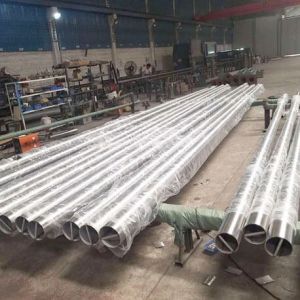
Stainless Steel Seamless 316L Pipes
M-Pipe & Fitting Solution Inc is a reputable business that makes and sells Stainless Steel Seamless 316L Pipes of high quality. Stainless steel seamless 316L pipes are made of stainless steel alloy 316L, which is a low-carbon form of stainless steel 316. The seamless method used to make these pipes includes heating a solid block of stainless steel and making holes in it to make a hollow tube. The seamless form of these pipes has a lot of advantages. It makes the pipes stronger and last longer, so they can be used in harsh settings and high-pressure situations. Because there are no welded seams, there are no possible weak spots, and the inside is smooth, which lowers turbulence and makes it easier to move liquids or gases. People know that stainless steel 316L doesn’t rust, especially in environments with chlorides. Because of this, seamless 316L pipes can be used in places where there is a lot of corrosion, like chemical processing, oil and gas plants, the sea, and other similar places. ASTM A312 TP 316L Pipes, ASME Stainless Steel Seamless 316L Pipes, or Stainless Steel UNS S31603 Pipes are very durable and resistant to rust. Because of their high quality and dependability, these pipes are widely used in many different businesses. In the ASTM A312 specification, the standards for seamless, welded, and highly cold-worked austenitic stainless steel pipes are laid out. The grade of stainless steel used in these lines is called TP 316L. It is a low-carbon version of stainless steel 316. 316L is great for high-temperature uses because it has a low carbon content, which makes it less likely that carbides will form during welding. Common names for stainless steel UNS S31603 pipes are ASME 316L pipes or ASTM A312 TP 316L pipes. These pipes are flexible and are often used in a wide range of industrial uses. This pipe is made of stainless steel grade 316L, which is a version of stainless steel 316 with less carbon. Let’s find out more about what makes these pipes what they are. ASTM A312 is a standard guideline for austenitic stainless steel pipes that are seamless, welded and have had a lot of cold work done to them. The TP 316L mark means that the pipes meet the requirements for Type 316L stainless steel in the ASTM A312 standard. Its general performance and resistance to corrosion are helped by small amounts of chromium, nickel, molybdenum, and other elements. Instead of smooth pipes, you can use welded pipes made of stainless steel 316L. These tubes are made by welding together strips or plates of stainless steel using methods like laser welding or TIG welding (Tungsten Inert Gas). The tubes are strong and stable because they are welded, so they can be used in places where seamless lines would not be needed. Pipes and tubes made of stainless steel 316L are used a lot in industries like chemical processing, oil and gas, pharmaceuticals, food processing, and marine uses. People like them because they don’t rust in harsh environments like those with chlorides, acids, and alkalis. Because they are strong at high temperatures and weld well, Stainless Steel Seamless 316L Pipes can be used for high-temperature uses and welding. Welded stainless steel 316L tubes can be used instead of seamless pipes to save money. They are good for uses where the pipe’s appearance doesn’t matter as much as its strength and usefulness. 316L stainless steel is often made up of chromium, nickel, molybdenum, and other elements that make it stronger. These parts help the pipes resist corrosion, especially in harsh environments like chemical processing plants, oil and gas refineries, and maritime uses.
Size : :
...more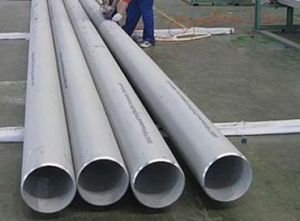
Stainless Steel Seamless 316H Pipes
M-Pipe & Fitting Solution Inc is a reputable business that makes and sells Stainless Steel Seamless 316H Pipes of high quality. These pipes are known for being very strong, able to fight corrosion well, and able to handle high temperatures. Stainless Steel Seamless 316H Pipes are made from stainless steel grade 316 that has been changed to have a lot of carbon. Compared to regular 316 stainless steel, it has more carbon, which makes it stronger and better able to handle high temperatures. During the process of making these pipes, there are no joints or gaps that are welded, so the surface is smooth and continuous. The advantages of this seamless design are better flow, less chance of leaks or failures, and better protection from corrosion. Seamless pipes are often used in oil and gas, petrochemical, chemical processing, and power creation. Another important quality of Stainless Steel Seamless 316H Pipes is that they don’t rust. Like other stainless steel alloys, the stainless steel alloy AISI 316H is very resistant to acids, alkalis, and chlorides, which are all things that can cause corrosion. Even when the pipes are exposed to strong chemicals or harsh industrial settings, their resistance to corrosion keeps them strong and reliable. Stainless steel seamless 316H pipes can also be bent and welded in great ways. They are easy to make into different shapes and sizes, allowing for custom patterns and easy installation. Because they are flexible and can be used for many different things, they can be used for things like process pipes, pressure tanks, and structural components. The UNS S31609 name for stainless steel pipe is part of the Unified Numbering System (UNS). It is 316 stainless steel that has been changed by adding a lot of carbon to make it stronger at high temperatures. UNS S31609 Stainless Steel Pipe is the name for the pipe made from this type of stainless steel. UNS S31609 stainless steel pipe is the exact name for pipes made of grade 316H stainless steel that are not joined together. The UNS identification method gives a unique name to a lot of different materials. Stainless Steel Seamless 316H Pipes are perfect for harsh settings because they are strong and don’t rust in pits or cracks. The seamless method of making pipes improves their general performance and makes sure that the surface is smooth and free of flaws. UNS S31609 stainless steel pipes are pipes made of grade 316H stainless steel that are not joined together. The UNS designation system gives each object a specific code, which makes it easy to identify and classify. Because it is so resistant to corrosion, including pitting and crevice corrosion, stainless steel type 316H is the best choice for harsh environments. The smooth, unbroken surface that is made sure of during the seamless making process makes the pipes work better and be more reliable as a whole. AISI 316H Welded Pipe is the American Iron and Steel Institute’s (AISI) name for stainless steel grade 316H. The name “AISI 316H Welded Pipe” lets you know that the pipe was made by welding. To make welded pipes, different types of welding are used to join the edges of two or more pieces of stainless steel. The AISI 316H Welded Pipe is another type of pipe made out of Stainless Steel Seamless 316H Pipes. The AISI 316H grade is what the American Iron and Steel Institute (AISI) calls the 316H grade. With TIG (Tungsten Inert Gas) or MIG (Metal Inert Gas) welding, for example, the edges of stainless steel sheets or plates are joined together to make lines that can be welded. This way of bonding ensures that pipes will be strong and last a long time. The AISI 316H Welded Pipe is another type of stainless steel grade 316H pipe. AISI 316H is what the American Iron and Steel Institute (AISI) calls Grade 316H. With TIG (Tungsten Inert Gas) or MIG (Metal Inert Gas) welding, for example, the edges of stainless steel sheets or plates are joined together to make lines that can be welded. The soldering method makes the pipes strong enough to stand up to mechanical stresses and pressure. 316H Stainless Steel ERW Pipe: “316H Stainless Steel ERW Pipe” refers to pipes made from stainless steel grade 316H and made using the ERW process. In this method, the pipe is made by running a continuous coil of stainless steel through several rollers. The edges are then connected using an electric resistance welding method.ERW, or electric resistance welding, is used to make ERW lines out of 316H stainless steel. “316H Stainless Steel ERW Pipe” refers to pipes made from grade 316H stainless steel and made with the ERW process. In this method, the pipe is made by running a continuous coil of stainless steel through several rollers. The edges are then connected using an electric resistance welding method. ERW (Electrical Resistance Welding) pipes made of 316H stainless steel are made uniquely. Electric resistance welding is used to join the edges of stainless steel lines that are made by running them over rollers over and over again. The ERW method gives accurate measurements, good structural integrity, and a smooth inner surface, which helps fluids flow properly. ASTM A249 316H Pipes are pipes made of stainless steel grade 316H that meet the ASTM A249 standard. Most of the ways that these pipes are used require high temperatures. ASTM, which stands for the American Society for Testing and Materials, has made rules for ASTM A249 316H Pipes. The A249 standard covers tubes made of welded austenitic steel in the boiler, superheater, heat exchanger, and condenser. Chemical processing, oil and gas, and power generation all use a lot of pipes made to ASTM A249 316H standards for high-temperature uses. ASTM A249 316H Pipes are made to meet the standards set by the American Society for Testing and Materials (ASTM). The A249 standard covers tubes made of welded austenitic steel in the boiler, superheater, heat exchanger, and condenser. Pipes made to the standards of ASTM A249 316H are often used in the oil and gas, power generation, and chemical processing industries because they can handle high temperatures. Stainless Steel Seamless 316H Pipes, like UNS S31609 stainless steel pipe, AISI 316H welded pipe, 316H stainless steel ERW pipe, and ASTM A249 316H pipes, are resistant to rust, strong at high temperatures, and last a long time. The ability of these pipes to survive high temperatures and corrosion is important in many industries. Because of the different methods and specifications used to make the pipes, they are guaranteed to meet certain application criteria. Seamless UNS S31609 stainless steel pipes, AISI 316H weld pipes, 316H stainless steel ERW pipes, and ASTM A249 316H pipes are very strong and immune to corrosion. They are great for many industrial uses because they are very strong and don’t change much when heated. Different ways of making these pipes and paying close attention to precise specifications allow them to meet the high standards of several businesses. Pipes and tubes from M-Pipe & Fitting Solution Inc. are certified to meet foreign standards like API, ASTM, and ISO 9001:2015.
Size : :
...more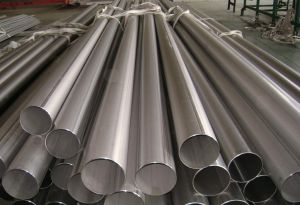
Stainless Steel Seamless 316 Pipes
M-Pipe & Fitting Solution Inc is a reputable company that manufactures and supplies high-quality Stainless Steel Seamless 316 Pipes. Stainless Steel Seamless 316 Pipes for their remarkable quality and effectiveness. In a variety of applications, these pipes’ outstanding corrosion resistance, high tensile strength, and adaptability are all features that were especially considered when designing them. These seamless pipes are noted for their outstanding corrosion resistance in various chemical, marine, and industrial conditions. They are made of AISI 316 stainless steel. The seamless design makes A smooth internal surface possible, which lowers friction and pressure drop while moving fluid. These pipes are excellent for demanding applications that demand dependable and long-lasting performance because the AISI 316 stainless steel provides greater strength and durability. These pipes can sustain high pressure and temperature conditions without losing structural integrity because of their high tensile strength.Industries like oil and gas, petrochemical, pharmaceutical, food processing, and many more use Stainless Steel Seamless 316 Pipes. extensively. They are used for structural elements, heat exchangers, fluid transportation, and architectural purposes. These pipes’ seamless design minimizes the possibility of leaks, enabling the safe and effective transportation of liquids and gases. With longer service lives and lower maintenance costs, their corrosion resistance features make them perfect for handling corrosive fluids or conditions. SS UNS S31600 Round Pipe: This pipe is used for applications that call for adequate fluid flow and is distinguished by its round cross-section. The inside surface’s smoothness reduces friction, enabling the movement of liquids or gases without interruption. Due to its high dependability and toughness, the SS UNS S31600 Round Pipe is appropriate for various industries because of its smooth inside surface lowers friction and ensures fluid or gas movement without interruption. This round pipe is frequently used in water treatment, chemical processing, and oil and gas, where fluid movement is essential. It is famous for demanding applications due to its dependable performance and longevity. Because of its smooth inside surface, it provides adequate fluid flow while reducing pressure drop and friction. The SS UNS S31600 Round Pipe is used in sectors including water treatment, oil and gas, and chemical processing, where optimizing fluid flow is crucial. It suits difficult situations due to its longevity, high tensile strength, and corrosion resistance SS UNS S31600 Pipe: The SS UNS S31600 Pipe is versatile in building projects and is available in various shapes, including square and rectangular. The round pipe variation and this one are structurally sound and have outstanding corrosion resistance. Numerous applications that call for dependable and robust piping systems frequently use this pipe. In a similar vein, the UNS S31600 SS Pipe is offered in a variety of shapes, including square and rectangular varieties. This versatility makes the ability to adapt to particular design requirements possible, enabling smooth integration into various construction projects. Because of its superior structural integrity and resistance to corrosion, the SS UNS S31600 Pipe is appropriate for a wide range of applications.The structural integrity and outstanding corrosion resistance are identical to those of the round pipe form. The SS UNS S31600 Pipe is frequently employed in sectors including pharmaceuticals, food processing, and architecture, where precise design specifications and corrosion resistance are crucial. It offers a dependable and durable solution for structural and fluid transfer applications. AISI 316 Seamless Pipe: The AISI 316 seamless pipe has a reputation for being of the highest caliber. Leaks and failures are less likely because of the seamless construction, which guarantees a homogeneous, smooth surface devoid of any welded connections. Pharmaceuticals, food and beverage, maritime, and chemical processing industries use AISI 316 seamless pipes. They are widely prized for their resistance to corrosion, hygienic qualities, and capacity to survive challenging situations. The possibility of leaks or pipe failures is reduced by its seamless design, which guarantees a uniform and smooth surface devoid of any welded connections. This makes it perfect for fields where cleanliness, sanitization, and corrosion resistance are crucial, such as pharmaceuticals, food processing, and maritime settings. The AISI 316 seamless pipe is widely prized for its capacity to withstand challenging circumstances and uphold the integrity of fluid conveyance. These seamless pipes ensure good flow characteristics and reduce the possibility of leaks because they have a smooth interior surface and no welded joints. In fields where reliability and corrosion resistance are essential, such as petrochemicals, marine, and offshore applications, AISI 316 seamless pipes are widely utilized. SS 316 Welded Tube: For applications with unnecessary seamless pipes, SS 316 welded tube offers a cost-effective solution. These tubes are made by welding the edges of stainless steel plates or coils, producing a robust and long-lasting product. While the corrosion resistance of welded connections may be slightly less than that of Stainless Steel Seamless 316 Pipes, SS 316 welded tubes nevertheless function admirably and are helpful in various settings.The SS 316 welded tube offers a cost-effective solution for applications that do not require seamless pipes. The SS 316 welded tube is produced by joining the edges of stainless steel coils or plates, and it is solid and long-lasting. While the corrosion resistance of welded joints may be slightly less than that of seamless pipes, they nonetheless offer outstanding performance in various situations. Because of this, the SS 316 welded tube is suitable for uses like structural parts, heat exchangers, and automobile exhaust systems.While the corrosion resistance of SS 316 welded tubes may be slightly less than that of seamless pipes due to the welding process, they nonetheless function well in various situations. They are used in fields where cost-effectiveness and structural integrity are crucial, such as the automotive, structural engineering, and construction sectors The outstanding corrosion resistance, high tensile strength, and adaptability of stainless steel seamless 316 pipes have earned them a stellar reputation. Industry applications for Stainless Steel Seamless 316 Pipes. include chemical processing, oil & gas, pharmaceuticals, food processing, and more. They provide dependable performance, ensuring fluids flow smoothly and efficiently while preserving the structural integrity of piping systems. These pipes are the first preference for challenging projects due to their remarkable corrosion resistance, high tensile strength, and adaptability. Strength and durability are provided by welding the edges of stainless steel plates or coils during production. M-Pipe & Fitting Solution Inc provides certified Pipes & Tubes that meet international standards such as API, ASTM, and ISO 9001:2015.
...more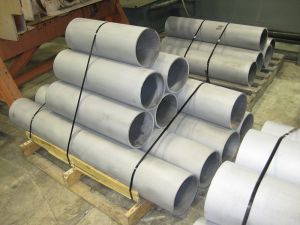
Stainless Steel Seamless 310S Pipes
M-Pipe & Fitting Solution Inc is a reputable company that manufactures and supplies high-quality Stainless Steel Seamless 310S Pipes. M-Pipe & Fitting Solution Inc is a leading company specializing in producing and supplying high-quality stainless steel seamless pipes. Stainless steel seamless 310S pipes are in high demand across various industries. These pipes are built of austenitic stainless steel alloy grade 310S, with a high chromium and nickel concentration. These pipes’ seamless design guarantees a continuous and consistent structure without any welded connections, boosting their durability, strength, and leak resistance. For applications needing resistance to corrosive environments and the capacity to sustain increased temperatures, stainless steel seamless 310S pipes provide a dependable and effective piping solution. Stainless steel seamless 310S pipes are used in heat treatment equipment, chemical processing plants, and power generation facilities because of their outstanding performance and long-lasting durability. Features and Advantages: Stainless steel seamless 310S pipes have several advantages, such as: Resistance to high temperatures and thermal cycling: The 310S grade stainless steel is made to withstand these conditions without compromising its structural integrity. It has a maximum temperature resistance of 1,200 °C (2,192 °F). Due to their outstanding corrosion resistance, stainless steel 310S pipes are suitable for use in challenging situations like chemical manufacturing facilities or marine conditions. Oxidation resistance: Even at high temperatures, 310S stainless steel has exceptional resistance to oxidation due to its high chromium concentration. Strength and endurance: 310S stainless steel pipes have excellent mechanical features, such as high strength and toughness, guarantee long-lasting performance in demanding applications. Versatility: Because of their exceptional qualities, these pipes are appropriate for various industries, including oil and gas, petrochemical, power generating, and food processing. Applications: Stainless steel seamless 310S pipes are used in a variety of fields and applications, such as: High-temperature applications: They are utilized in radiant tubes, heat treatment equipment, furnaces, and other high-temperature settings. These pipes are utilized in chemical processing facilities to transport corrosive substances, acids, and alkaline solutions. Industry of oil and gas: Because of its durability and resistance to corrosion, 310S pipes are used in pipelines, offshore platforms, and oil refineries. Welded stainless steel pipes made of 310S stainless steel are additionally offered in addition to seamless pipes. These pipes are made by joining the stainless steel strip or plate’s edges through welding, creating a joint structure. In many industries, welded pipes are frequently utilized where seamless construction is unnecessary. The edges of stainless steel strips or plates are joined by welding to create 310S stainless steel welded pipes. There are several methods for welding, including laser welding, metal inert gas welding, and tungsten inert gas welding. When seamless pipes are unnecessary, welded pipes are more affordable.310S Rectangular Pipes: Rectangular Stainless steel seamless 310S pipes have a rectangular cross-section and are frequently utilized when a particular shape is required. They are frequently used in structural, building, and architectural projects that call for rectangular tubes, including building frames, railings, and furniture. There are many shapes of stainless steel 310S pipes, including rectangular ones. Due to their rectangular cross-section, rectangular pipes are ideal for applications that call for a square or rectangular shape. The American Society for Testing and Materials (ASTM) established the ASTM A312 specification standard for austenitic stainless steel seamless, welded, and highly cold-worked pipes. To ensure adherence to industry standards, stainless steel 310S pipes can be produced following ASTM A312 criteria. For austenitic stainless steel pipes that are seamless, welded, and heavily cold-worked, ASTM A312 is a commonly used specification standard. It includes different grades and sizes of seamless and welded stainless steel pipes. Stainless steel ASTM A312 pipes are frequently used in the oil and gas, chemical, and food processing sectors. Stainless steel grade 310S is designated by UNS S31008 Stainless Steel 310s , part of the Unified Numbering System (UNS). It is a grade 310 that contains less carbon and offers improved resistance to sensitization during welding or high-temperature exposure. Due to its outstanding high-temperature strength, corrosion resistance, and oxidation resistance, UNS S31008 Stainless Steel 310s is well-suited for various applications in numerous industries. The Unified Numbering System (UNS) code for stainless steel grade 310S is UNS S31008 Stainless Steel 310s . It is a grade 310 low-carbon variant that provides better high-temperature resistance. Numerous industries, including chemical processing, furnace parts, and heat exchangers, frequently employ UNS S31008.Stainless steel seamless 310S pipes provide outstanding corrosion resistance and high-temperature strength. They are incredibly dependable and adaptable pipeline solutions. These pipes can be used in harsh conditions thanks to the grade 310S stainless steel’s high chromium and nickel content, which offers good corrosion resistance. Stainless steel seamless 310S pipes design guarantees their sturdiness and integrity by removing the weak spots brought on by welded joints and lowering the possibility of leakage. They are perfect for applications where effective fluid conveyance is essential because of their seamless design, which enables smoother fluid flow.M-Pipe & Fitting Solution Inc provides certified Pipes & Tubes that meet international standards such as API, ASTM, and ISO 9001:2015.
...more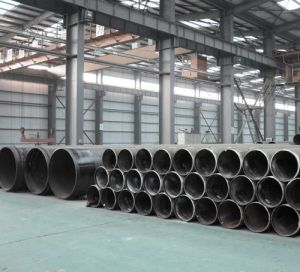
Stainless Steel Seamless 310H Pipes
M-Pipe & Fitting Solution Inc is a reputable business that makes and sells Stainless Steel Seamless 310H Pipes of high quality. Stainless steel seamless 310H pipes are made of high-quality stainless steel grade 310H, which is a type of 310 stainless steel metal. A seamless method was used to make these pipes, which means there are no weld gaps. Austenitic stainless steel type 310H is known for being very strong and rust resistance at high temperatures. Compared to regular 310 stainless steel, it has a higher carbon level and more chromium and nickel than usual. Because it has more carbon, the alloy is better able to handle high temperatures and prevent oxidation and scaling. Standards from the American Society for Testing and Materials (ASTM) and the American Society of Mechanical Engineers (ASME) are used to make seamless stainless steel 310H pipes. They may also follow foreign standards set by groups like the Japanese Industrial Standards (JIS) or the German Institute for Standardization (DIN). Before buying these pipes, it’s important to ensure they have the right certifications and requirements, such as seamless stainless steel pipes that meet ASTM A312/A213 standards. The corrosion resistance and strength at high temperatures of stainless steel 310H pipes and tubes that have been joined together are excellent. They are often used in industries like oil and gas, making chemicals, building, and making furniture. The UNS S31008 number tells you what type of stainless steel was used, and the ASTM A312 standard makes sure that quality and dependability are met. Stainless steel 310h welded tubes: Tubes are made from Stainless Steel Seamless 310H Pipes, a type of stainless steel metal that is different from 310 stainless steel. To make these tubes, stainless steel strips or plates are joined at their ends to make a shape that looks like a tube. Welded tubes are often used in many different industries for uses that need to be strong, durable, and corrosion resistance. Stainless Steel 310h Rectangular Pipes: Stainless steel 310H Rectangular Pipes are made of grade 310H stainless steel. People often use these pipes in industry, building, and architectural settings. The oblong shape of the pipes gives them strength and stability, which makes them good for uses that require them to hold more weight. The American Society for Testing and Materials (ASTM) made the ASTM A312 standard for seamless, soldered, and highly cold-worked austenitic stainless steel pipes. The 310H grade of stainless steel pipes is part of this standard. ASTM A312 stainless steel pipes are often used in places with high temperatures and a lot of corrosion, like in the chemical processing, oil and gas, and power generation industries. ASTM A312 stainless steel pipe: austenitic stainless steel pipes that are seamless, soldered, or highly cold-worked and meet the requirements of ASTM A312 are accepted by everyone as meeting the requirements of the standard. This standard is kept up to date by the American Society for Testing and Materials (ASTM). It covers a wide range of grades and specs for stainless steel pipes. The ASTM A312 guideline says that stainless steel pipes must meet standards for their chemical composition, mechanical qualities, dimensions, tolerances, testing methods, and marking. It makes sure that the pipes meet strict quality standards and can be used in industries like oil and gas, chemical processing, food processing, and medicines, among others. UNS S31008 stainless steel 310h pipes: UNS S31008 is the code for stainless steel type 310H in the Unified Numbering System (UNS). It is a change to the 310 stainless steel alloy that is made with a lot of carbon. It is very strong and resistant to rust at high temperatures. 310H stainless pipes are pipes made of stainless steel that are either joined or don’t have any seams. When temperatures are high and the environment is corrosive, these lines are used. 310H Stainless Steel Has No Welds Pipes are made of stainless steel grade 310H and are made without any gaps where they were welded together. In the seamless process, a piece of stainless steel called a billet is heated and then pierced to make an empty tube. Seamless pipes are better than those that are joined together because they are strong, uniform, and don’t have any weak places like welded pipes do. Stainless Steel Seamless 310H Pipes is austenitic stainless steel material with a lot of chromium and nickel. It is a form of 310 stainless steel that can be used at higher temperatures and has more carbon to make it more resistant to rust and stronger at high temperatures. The “H” in 310H, which usually runs from 0.04% to 0.10%, shows that it has a lot of carbon. This type is very resistant to corrosion, oxidation, and scaling at high temperatures. Applications: Stainless steel seamless 310H pipes are used in many places and for many different things, like: High-temperature environments: 310H pipes are often used in parts of furnaces, heat exchanges, kilns, radiant tubes, and machinery that does thermal processing. Petrochemical and chemical processing: These pipes can be used in petrochemical facilities, refineries, and chemical processing businesses because they don’t rust and can handle high temperatures. Power generation: 310H pipes are used in boiler tubes, superheaters, reheaters, and steam lines in power plants because they can handle high temperatures and high pressures. They are used in oil and gas research and production equipment, such as wellhead parts, manifolds, and flowlines because they are resistant to corrosion in harsh environments. Rectangular stainless steel 310H pipes are used in infrastructure, building projects, and artistic buildings because they are strong, last a long time, and look good. The ASTM A312, ASME SA312, ASTM A269, ASTM A213, and other industry standards and approvals are all met by stainless steel seamless 310H pipes. These standards make sure that the pipes work well, are of good quality, and are the right size. When thinking about using stainless steel pipes for a specific purpose, it’s important to keep in mind things like pressure ratings, temperature limits, chemical compatibility, and size requirements. Talking to experts in the field or the people who make stainless steel pipes can give you more specific help that fits your needs. Because it has a lot of chromium, nickel, and carbon, as well as a high percentage of chromium and nickel, Stainless Steel Seamless 310H Pipes are very strong at high temperatures and don’t rust or scale. Because of this, it works well for parts of furnaces, heat exchangers, kilns, and machines used for thermal processing. Pipes and tubes from M-Pipe & Fitting Solution Inc. are certified to meet foreign standards like API, ASTM, and ISO 9001:2015.
Size : :
...moreBe first to Rate
Rate ThisOpening Hours